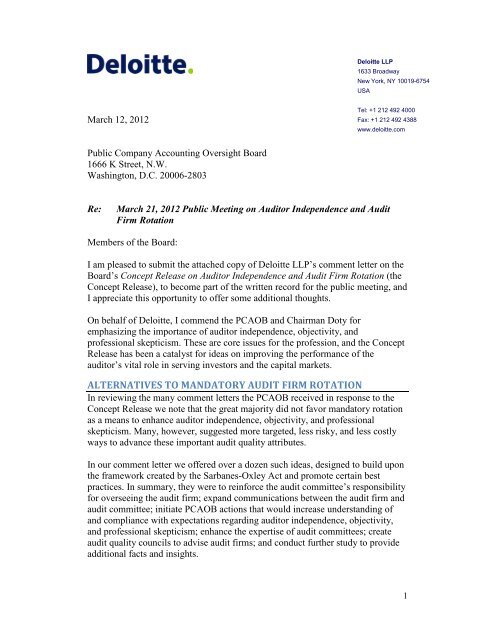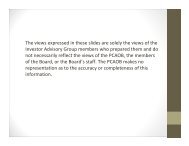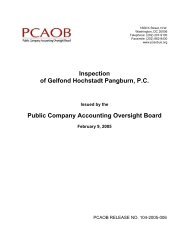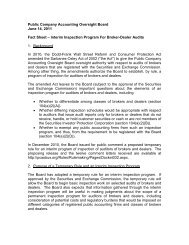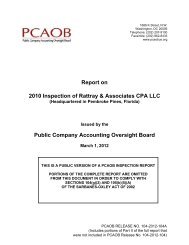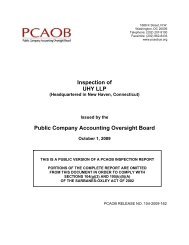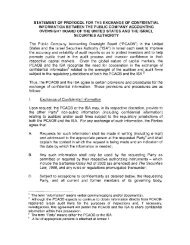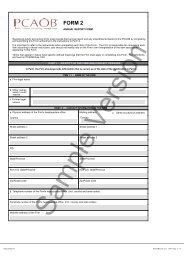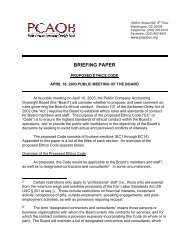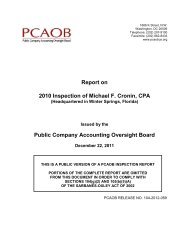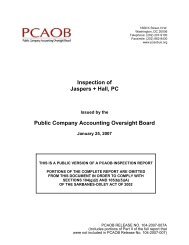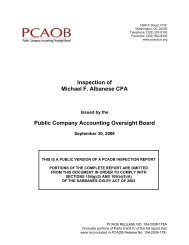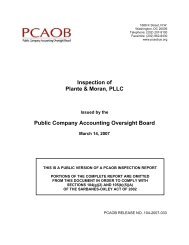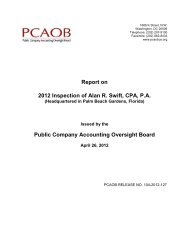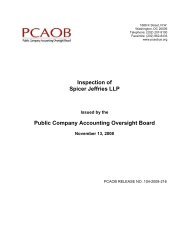alternatives to mandatory audit firm rotation - Public Company ...
alternatives to mandatory audit firm rotation - Public Company ...
alternatives to mandatory audit firm rotation - Public Company ...
Create successful ePaper yourself
Turn your PDF publications into a flip-book with our unique Google optimized e-Paper software.
Deloitte LLP<br />
1633 Broadway<br />
New York, NY 10019-6754<br />
USA<br />
March 12, 2012<br />
Tel: +1 212 492 4000<br />
Fax: +1 212 492 4388<br />
www.deloitte.com<br />
<strong>Public</strong> <strong>Company</strong> Accounting Oversight Board<br />
1666 K Street, N.W.<br />
Washing<strong>to</strong>n, D.C. 20006-2803<br />
Re:<br />
March 21, 2012 <strong>Public</strong> Meeting on Audi<strong>to</strong>r Independence and Audit<br />
Firm Rotation<br />
Members of the Board:<br />
I am pleased <strong>to</strong> submit the attached copy of Deloitte LLP’s comment letter on the<br />
Board’s Concept Release on Audi<strong>to</strong>r Independence and Audit Firm Rotation (the<br />
Concept Release), <strong>to</strong> become part of the written record for the public meeting, and<br />
I appreciate this opportunity <strong>to</strong> offer some additional thoughts.<br />
On behalf of Deloitte, I commend the PCAOB and Chairman Doty for<br />
emphasizing the importance of audi<strong>to</strong>r independence, objectivity, and<br />
professional skepticism. These are core issues for the profession, and the Concept<br />
Release has been a catalyst for ideas on improving the performance of the<br />
audi<strong>to</strong>r’s vital role in serving inves<strong>to</strong>rs and the capital markets.<br />
ALTERNATIVES TO MANDATORY AUDIT FIRM ROTATION<br />
In reviewing the many comment letters the PCAOB received in response <strong>to</strong> the<br />
Concept Release we note that the great majority did not favor manda<strong>to</strong>ry <strong>rotation</strong><br />
as a means <strong>to</strong> enhance audi<strong>to</strong>r independence, objectivity, and professional<br />
skepticism. Many, however, suggested more targeted, less risky, and less costly<br />
ways <strong>to</strong> advance these important <strong>audit</strong> quality attributes.<br />
In our comment letter we offered over a dozen such ideas, designed <strong>to</strong> build upon<br />
the framework created by the Sarbanes-Oxley Act and promote certain best<br />
practices. In summary, they were <strong>to</strong> reinforce the <strong>audit</strong> committee’s responsibility<br />
for overseeing the <strong>audit</strong> <strong>firm</strong>; expand communications between the <strong>audit</strong> <strong>firm</strong> and<br />
<strong>audit</strong> committee; initiate PCAOB actions that would increase understanding of<br />
and compliance with expectations regarding audi<strong>to</strong>r independence, objectivity,<br />
and professional skepticism; enhance the expertise of <strong>audit</strong> committees; create<br />
<strong>audit</strong> quality councils <strong>to</strong> advise <strong>audit</strong> <strong>firm</strong>s; and conduct further study <strong>to</strong> provide<br />
additional facts and insights.<br />
1
We observe that the ideas offered by other parties generally paralleled the themes<br />
in our suggestions. Three that were not in our letter but which are among the<br />
many we would support are <strong>audit</strong> <strong>firm</strong> issuance of transparency reports, 1<br />
evaluating the effects of planned new PCAOB <strong>audit</strong> quality standards, 2 and<br />
PCAOB efforts <strong>to</strong> inform and cooperate with <strong>audit</strong> committees <strong>to</strong> enhance overall<br />
<strong>audit</strong> effectiveness. 3<br />
EXTENDING THE BOARD’S INQUIRY<br />
The responses provide the Board a strong foundation on which <strong>to</strong> base further<br />
examination of ways <strong>to</strong> enhance audi<strong>to</strong>r independence, objectivity, and<br />
professional skepticism. But the Board also has the opportunity <strong>to</strong> broaden the<br />
inquiry <strong>to</strong> address <strong>audit</strong> quality as a whole.<br />
We believe broadening the scope would be in the best interest of inves<strong>to</strong>rs,<br />
because, as the Concept Release acknowledges, independence, objectivity, and<br />
professional skepticism are not the only determinants of <strong>audit</strong> quality. And it is<br />
overall <strong>audit</strong> quality that contributes <strong>to</strong> financial reporting quality, which should<br />
be the ultimate goal of any regula<strong>to</strong>ry system that holds inves<strong>to</strong>r protection as its<br />
mission.<br />
Including a range of stakeholders in the public meetings is a positive first step, but<br />
we hope formal public meetings are only a beginning. We recommend that the<br />
PCAOB engage with other regula<strong>to</strong>rs, inves<strong>to</strong>rs, boards and <strong>audit</strong> committees,<br />
financial executives, the <strong>audit</strong>ing profession, and others <strong>to</strong> seek the best result for<br />
inves<strong>to</strong>rs.<br />
REVIEW OF RESEARCH FINDINGS<br />
Our comment letter presented data on a variety of <strong>to</strong>pics pertinent <strong>to</strong> the inquiry<br />
and contained extensive appendices documenting information on research studies,<br />
informed opinion, and the status of manda<strong>to</strong>ry <strong>rotation</strong> policies abroad.<br />
Since December we have continued <strong>to</strong> moni<strong>to</strong>r developments and track the<br />
literature. We have identified some new research reports and other data, which<br />
will be noted in an updated comment letter that we will file by the April 22<br />
deadline. The new material does not affect the basis for the comments in our<br />
December filing.<br />
* * * * *<br />
As we said in our comment letter, inves<strong>to</strong>rs are best served when all the<br />
interconnected components of the financial reporting system are considered<br />
<strong>to</strong>gether. We encourage the PCAOB <strong>to</strong> work with the wide variety of market<br />
participants who have demonstrated an interest in this important subject, and we<br />
at Deloitte stand ready <strong>to</strong> continue <strong>to</strong> work with you in this way.<br />
2
I thank you for your consideration and look forward <strong>to</strong> participating in the<br />
meeting on March 21. If in the meantime you have any questions or would like <strong>to</strong><br />
discuss these matters further, please contact me at (212) 492-4508.<br />
On behalf of the partners and people of Deloitte:<br />
Joe Echevarria, CEO<br />
Deloitte LLP<br />
cc:<br />
James R. Doty, PCAOB Chairman<br />
Lewis H. Ferguson, PCAOB Member<br />
Jeanette M. Franzel, PCAOB Member<br />
Jay D. Hanson, PCAOB Member<br />
Steven B. Harris, PCAOB Member<br />
Martin F. Baumann, Chief Audi<strong>to</strong>r and Direc<strong>to</strong>r of Professional Standards<br />
Mary L. Schapiro, SEC Chairman<br />
Luis A. Aguilar, SEC Commissioner<br />
Daniel M. Gallagher, SEC Commissioner<br />
Troy A. Paredes, SEC Commissioner<br />
Elisse B. Walter, SEC Commissioner<br />
James L. Kroeker, SEC Chief Accountant<br />
Brian Croteau, SEC Deputy Chief Accountant<br />
1 Versions of this idea were suggested by the Center for Audit Quality, KPMG, and<br />
PricewaterhouseCoopers, among others.<br />
2 Versions of this idea were suggested by the Center for Audit Quality, Ernst & Young, KPMG,<br />
and PricewaterhouseCoopers, among others.<br />
3 Versions of this idea were suggested by Apple, BlackRock, Mike Cook, Ernst & Young, and<br />
McGladrey & Pullen, among others.<br />
3
Deloitte LLP<br />
1633 Broadway<br />
New York, NY 10019-6754<br />
USA<br />
December 8, 2011<br />
Tel: +1 212 492 4000<br />
Fax: +1 212 492 4388<br />
www.deloitte.com<br />
Mr. J. Gordon Seymour, Secretary<br />
<strong>Public</strong> <strong>Company</strong> Accounting Oversight Board<br />
1666 K Street, N.W.<br />
Washing<strong>to</strong>n, D.C. 20006-2803<br />
Re: Request for <strong>Public</strong> Comment on Concept Release on Audi<strong>to</strong>r Independence and Audit Firm<br />
Rotation, August 16, 2011 (PCAOB Release No. 2011-006, PCAOB Rulemaking Docket Matter<br />
No. 37)<br />
Dear Mr. Seymour:<br />
Deloitte & Touche LLP (Deloitte) is pleased <strong>to</strong> respond <strong>to</strong> the request for comments from the <strong>Public</strong><br />
<strong>Company</strong> Accounting Oversight Board (PCAOB or the Board) on its August 16, 2011 Concept Release<br />
on Audi<strong>to</strong>r Independence and Audit Firm Rotation (the Concept Release).<br />
EXECUTIVE SUMMARY<br />
Deloitte agrees that audi<strong>to</strong>r independence, objectivity, and professional skepticism are essential <strong>to</strong> <strong>audit</strong><br />
quality, which in turn promotes the effective functioning of capital markets. In response <strong>to</strong> the Board’s<br />
invitation <strong>to</strong> submit comments we under<strong>to</strong>ok a broad, fact-based assessment of the public company<br />
disclosure system <strong>to</strong> explore what steps can and should be taken <strong>to</strong> better serve the investing public. Our<br />
main conclusions:<br />
1. The Sarbanes-Oxley Act of 2002 (Sarbanes-Oxley) contains provisions that address concerns about<br />
management’s influence over audi<strong>to</strong>rs, including the potential for an “issuer pays” dis<strong>to</strong>rtion, by<br />
delegating primary responsibility for supervising and compensating audi<strong>to</strong>rs <strong>to</strong> the <strong>audit</strong> committee,<br />
an independent body that represents inves<strong>to</strong>r interests.<br />
2. In implementing the Sarbanes-Oxley reforms, best practices have emerged for structuring and<br />
conducting interactions among management, the <strong>audit</strong> committee, and audi<strong>to</strong>rs. If certain of these<br />
practices were augmented and set as requirements the result would be a more uniform achievement<br />
of high standards in areas important <strong>to</strong> the <strong>audit</strong> profession’s independence, objectivity, and<br />
professional skepticism.<br />
3. More uniform achievement of high standards would reinforce favorable trends in financial reporting.<br />
For example, there are positive signs in areas such as restatements and securities class-actions filings<br />
that include accounting-related allegations.<br />
1
4. Signs of improvement are not cause for complacency. The context within which public company<br />
disclosure occurs is changing. Economic and business conditions are increasingly global, complex,<br />
and volatile. Judgments on accounting and <strong>audit</strong>ing matters are becoming more challenging. The<br />
Board’s call for evaluating the existing system is therefore timely.<br />
5. We have found over a dozen areas in which building upon current best practices would enhance the<br />
potential of the Sarbanes-Oxley framework and strengthen public company disclosure. We believe<br />
more widespread adoption of the following practices would be especially beneficial:<br />
<br />
<br />
<br />
<br />
Audit committee guidance on <strong>audit</strong> fee negotiation. Require early and direct guidance from the<br />
<strong>audit</strong> committee in fee negotiations <strong>to</strong> reinforce the representation of shareholder interests.<br />
Audit <strong>firm</strong> communication with <strong>audit</strong> committee prior <strong>to</strong> earnings release. Provide that prior<br />
<strong>to</strong> the earnings release the <strong>audit</strong> <strong>firm</strong> has sufficient opportunity <strong>to</strong> review and discuss significant<br />
accounting and <strong>audit</strong>ing judgments with the <strong>audit</strong> committee.<br />
Audit <strong>firm</strong> discussion of inspection results with <strong>audit</strong> committee. Increase the sharing of<br />
findings and remediation efforts relating <strong>to</strong> internal and PCAOB inspections <strong>to</strong> furnish <strong>audit</strong><br />
committees with information relevant <strong>to</strong> their audi<strong>to</strong>r oversight role.<br />
Audit committee report on its oversight of <strong>audit</strong> <strong>firm</strong>. Define an expanded scope for the <strong>audit</strong><br />
committee report on its audi<strong>to</strong>r oversight and move the report from the proxy statement <strong>to</strong> the<br />
Form 10-K <strong>to</strong> enhance its timeliness and prominence.<br />
6. We conducted an objective assessment of the literature on manda<strong>to</strong>ry <strong>rotation</strong> and performed our<br />
own research on selected issues. The appendices contain references <strong>to</strong> the information we collected<br />
and reviewed. Our chief findings from this analysis:<br />
<br />
<br />
<br />
<br />
Audi<strong>to</strong>r tenure and <strong>audit</strong> quality. Research studies show that restatements and frauds are less<br />
likely <strong>to</strong> occur with longer audi<strong>to</strong>r tenure.<br />
Findings from research. The majority of studies in the literature on manda<strong>to</strong>ry <strong>rotation</strong> reach an<br />
unfavorable conclusion on the balance between costs and benefits.<br />
Implementation impact. If manda<strong>to</strong>ry <strong>rotation</strong> were required at the 500 largest U.S. companies,<br />
a 10-year phase-in process would entail 50 audi<strong>to</strong>r changes every year compared <strong>to</strong> the recent<br />
average rate of five per year.<br />
Experience abroad. The economies and capital markets of countries that have adopted<br />
manda<strong>to</strong>ry <strong>rotation</strong> are not directly comparable <strong>to</strong> those of the United States. Some countries that<br />
have adopted the policy have discontinued or curtailed it. Research that is available tends <strong>to</strong> be<br />
unfavorable on the effects of manda<strong>to</strong>ry <strong>rotation</strong>.<br />
7. The work we have done suggests that building upon the framework created by Sarbanes-Oxley<br />
would be more effective than adopting manda<strong>to</strong>ry <strong>rotation</strong>. However, we are open <strong>to</strong> additional<br />
study that would shed more light on the issues surrounding audi<strong>to</strong>r independence, objectivity, and<br />
professional skepticism. We would welcome the opportunity <strong>to</strong> join the Board, the rest of the <strong>audit</strong><br />
profession, public companies, direc<strong>to</strong>rs, inves<strong>to</strong>rs, and other stakeholders in further pursuing the<br />
inquiry the Board has initiated on this subject.<br />
2
ADOPTING A SYSTEM-WIDE PERSPECTIVE<br />
System for supporting inves<strong>to</strong>rs and capital markets<br />
The Concept Release appropriately frames the role of the independent <strong>audit</strong> in the context of the value it<br />
provides <strong>to</strong> users of public companies’ financial statements. The independent <strong>audit</strong> of public company<br />
financial statements is just one component of an extensive and interconnected system <strong>to</strong> protect<br />
inves<strong>to</strong>rs and promote the effective functioning of capital markets. It is therefore important <strong>to</strong> consider<br />
any changes with the entire system in view.<br />
Revisions <strong>to</strong> the financial segment of the system<br />
Concerns about the causes of the recent financial crisis are being addressed through provisions of the<br />
Dodd-Frank Act and the Basel III accord. An implication is that any policy changes involving <strong>audit</strong>s<br />
must take in<strong>to</strong> account the amount of adjustment already underway in the financial services sec<strong>to</strong>r as<br />
banks and other institutions implement the emerging regula<strong>to</strong>ry requirements.<br />
<strong>Public</strong> company disclosure portion of the system<br />
The public company disclosure portion of the system includes company management, the <strong>audit</strong><br />
committee of the board of direc<strong>to</strong>rs, and the <strong>audit</strong> profession. The system is largely regulated by the<br />
Securities and Exchange Commission (SEC), with support from the PCAOB and the Financial<br />
Accounting Standards Board.<br />
The public company disclosure system underwent substantial changes with the implementation of<br />
Sarbanes-Oxley. A major component of the law was the creation of the PCAOB.<br />
Sarbanes-Oxley also put in<strong>to</strong> place partner <strong>rotation</strong> requirements <strong>to</strong> provide <strong>audit</strong> teams with a fresh<br />
perspective on a regular basis. In developing the partner <strong>rotation</strong> regulations required by Sarbanes-<br />
Oxley, the SEC cited the need <strong>to</strong> strike a balance between a “fresh look” at the engagement and the<br />
benefits of maintaining continuity and quality. 1<br />
Congress made clear in the law that, as representatives of companies’ inves<strong>to</strong>rs, it is independent <strong>audit</strong><br />
committees and not management that have clear responsibility <strong>to</strong> select, compensate, and oversee the<br />
work of independent outside audi<strong>to</strong>rs. The law explicitly states that the <strong>audit</strong> <strong>firm</strong> “shall report directly<br />
<strong>to</strong> the <strong>audit</strong> committee” and thus interposed the <strong>audit</strong> committee between management and the <strong>audit</strong><br />
<strong>firm</strong>. Sarbanes-Oxley also ensured that the <strong>audit</strong> committee has the resources it needs <strong>to</strong> execute its<br />
duties.<br />
Key indica<strong>to</strong>rs show improvements in system performance<br />
In the Concept Release the Board observed that its inspections lead it <strong>to</strong> believe that <strong>audit</strong> quality has<br />
improved in recent years. Academic research con<strong>firm</strong>s that financial reporting has improved since the<br />
adoption of Sarbanes-Oxley. 2 A survey of <strong>audit</strong> committees conducted by the Center for Audit Quality<br />
in 2008 showed that 82 percent of <strong>audit</strong> committees responding believed that <strong>audit</strong> quality had improved<br />
in the several years prior. 3 Studies of <strong>audit</strong> committee performance since the passage of Sarbanes-Oxley<br />
indicate that strong <strong>audit</strong> committees contribute <strong>to</strong> <strong>audit</strong> quality. 4<br />
Certain indica<strong>to</strong>rs of financial reporting and <strong>audit</strong> quality also support the conclusion that the public<br />
company disclosure system is showing improved performance. For example, a recent analysis covering<br />
statistics through Oc<strong>to</strong>ber of this year suggests the number of restatements by larger companies will<br />
decrease in 2011 for the sixth straight year. 5 Securities class-action filings that included accountingrelated<br />
allegations have dropped 60 percent since 2002. 6<br />
3
Exhibit 1: Financial statement restatements, 2003-2011<br />
Companies with public float over $75 million; 2011 data through Oc<strong>to</strong>ber<br />
555<br />
487<br />
309<br />
319<br />
189<br />
229<br />
156 148<br />
112<br />
2003 2004 2005 2006 2007 2008 2009 2010 2011<br />
Source: Wall Street Journal, Audit Analytics<br />
Exhibit 2: Class action filings including accounting-related allegations, 2002-2010<br />
130<br />
108<br />
100<br />
78<br />
68<br />
78<br />
91<br />
59<br />
46<br />
2002 2003 2004 2005 2006 2007 2008 2009 2010<br />
Source: Corners<strong>to</strong>ne Research<br />
Our own observations are consistent with the data. In our experience <strong>audit</strong> professionals consistently<br />
make a strong effort <strong>to</strong> appropriately challenge conclusions reached by a company’s management, in the<br />
interest of ensuring accurate and transparent financial reporting <strong>to</strong> inves<strong>to</strong>rs.<br />
SUGGESTED IMPROVEMENTS TO THE EXISTING SYSTEM<br />
New challenges for public company disclosure<br />
Signs of improving performance do not provide a basis for complacency. The Board followed its<br />
observation that <strong>audit</strong> quality has shown improvement with the statement that, “more can be done <strong>to</strong><br />
bolster audi<strong>to</strong>rs’ ability and willingness <strong>to</strong> resist management pressure.” This is a definite imperative.<br />
New challenges confront the public company disclosure system, and indeed the entire system for<br />
protecting inves<strong>to</strong>rs and promoting the effective functioning of capital markets.<br />
4
Globalization and advanced technologies are making the business environment more complex and<br />
changeable. 7 Since the recent financial crisis the world has experienced new levels of capital market<br />
volatility, political uncertainty, and economic turbulence. 8 Accounting and <strong>audit</strong>ing standards are<br />
evolving. Financial statements are increasingly complex and entail growing reliance on management<br />
judgments. 9<br />
Other fac<strong>to</strong>rs could be added <strong>to</strong> the list, including shortened Form 10-K filing deadlines combined with<br />
significantly enhanced <strong>audit</strong> documentation requirements, and increasingly sophisticated business<br />
models.<br />
Consequently it is important <strong>to</strong> examine the public company disclosure system <strong>to</strong> see whether it can be<br />
strengthened in the face of new pressures. The Board’s solicitation of comments on ways <strong>to</strong> enhance<br />
audi<strong>to</strong>r independence, objectivity, and professional skepticism is a timely call <strong>to</strong> make a careful<br />
assessment of the mechanisms that help maintain inves<strong>to</strong>r confidence.<br />
Building on the Sarbanes-Oxley framework<br />
Our analysis of the current system has identified potential improvements the Board should consider.<br />
Generally these involve augmenting and expanding practices that have been adopted within the<br />
Sarbanes-Oxley policy environment. The practices are in use at many companies but are not universal. If<br />
they were <strong>to</strong> be required, and in some cases strengthened, the result would be greater uniformity across<br />
the system at a higher level of performance. Similarly, there are areas where building on existing<br />
regula<strong>to</strong>ry policies and approaches would be beneficial.<br />
These suggested improvements are not exhaustive with respect <strong>to</strong> improving <strong>audit</strong> quality. The<br />
challenges <strong>to</strong> <strong>audit</strong> quality are varied, and are both internal and external <strong>to</strong> the <strong>audit</strong> profession. We<br />
agree that audi<strong>to</strong>r independence, objectivity, and professional skepticism are bedrocks of <strong>audit</strong> quality,<br />
however, and have therefore focused our recommendations on those specific aspects of <strong>audit</strong> quality, as<br />
requested in the Concept Release.<br />
We note that the Concept Release expresses a preference for ideas that are within the PCAOB’s<br />
authority. For the reasons discussed above, we believe that inves<strong>to</strong>rs are best served when the system is<br />
viewed as a whole and that changes are made where they will be the most effective without adding<br />
unnecessary costs. Thus, we have not limited our discussion <strong>to</strong> ideas within the PCAOB’s authority,<br />
although many would require PCAOB action.<br />
Audit <strong>firm</strong> relationship with <strong>audit</strong> committee<br />
As noted above, a fundamental precept of the Sarbanes-Oxley policy framework is that the <strong>audit</strong><br />
committee represents shareholders in selecting, compensating, and overseeing the audi<strong>to</strong>r. The first set<br />
of suggested improvements would underscore the primacy of the <strong>audit</strong> committee in managing the<br />
company’s relationship with the audi<strong>to</strong>r, independent from management. The ideas all entail augmenting<br />
and formalizing practices that are in use at many companies:<br />
1. Audit committee reviews <strong>firm</strong>s seeking appointment as audi<strong>to</strong>r. The direct reporting<br />
relationship between the <strong>audit</strong> <strong>firm</strong> and the <strong>audit</strong> committee should be emphasized from the<br />
outset by ensuring that, when a change in audi<strong>to</strong>rs is under consideration, the <strong>audit</strong> committee<br />
plays a prominent role in the process. This could be achieved by requiring that <strong>audit</strong> committees<br />
meet with candidate <strong>audit</strong> <strong>firm</strong>s without prior review of the <strong>firm</strong>s by management. Additionally,<br />
the <strong>audit</strong> committee could be designated as the recipient of proposals from <strong>audit</strong> <strong>firm</strong>s seeking <strong>to</strong><br />
replace the current audi<strong>to</strong>r, with a copy furnished <strong>to</strong> management.<br />
5
2. Audit committee provides guidance on <strong>audit</strong> fee negotiation. Congress recognized the “issuer<br />
pays” concern; in Sarbanes-Oxley it required that the <strong>audit</strong> committee be responsible for<br />
compensating the outside audi<strong>to</strong>r, and for the pre-approval of services. This arrangement should<br />
be supported by a requirement that <strong>audit</strong> fee negotiation not occur except with early and direct<br />
<strong>audit</strong> committee guidance. Formalizing this pro<strong>to</strong>col would ensure that inves<strong>to</strong>rs, through the<br />
independent <strong>audit</strong> committee, have a “seat at the table” during the process of determining the<br />
fees <strong>to</strong> be paid <strong>to</strong> the audi<strong>to</strong>r.<br />
3. Successor <strong>audit</strong> partner meets with <strong>audit</strong> committee. When a new partner is assigned <strong>to</strong><br />
replace one whose <strong>rotation</strong> term has expired, the <strong>audit</strong> <strong>firm</strong> should be required <strong>to</strong> discuss the<br />
partner’s qualifications with the <strong>audit</strong> committee directly before any candidates are reviewed by<br />
management. A universal requirement <strong>to</strong> engage with the <strong>audit</strong> committee on this issue would<br />
emphasize the reporting relationship between the <strong>audit</strong> committee and the outside audi<strong>to</strong>r, help<br />
the <strong>audit</strong> committee understand the partner’s appropriateness for the engagement, and establish<br />
the relationship between the <strong>audit</strong> committee and the partner.<br />
4. Audit committee provides audi<strong>to</strong>r oversight information <strong>to</strong> inves<strong>to</strong>rs. Audit committees are<br />
required <strong>to</strong> report certain activities related <strong>to</strong> their oversight of outside audi<strong>to</strong>rs in the company’s<br />
annual proxy statement. Defining an expanded scope for the <strong>audit</strong> committee report would more<br />
completely inform inves<strong>to</strong>rs about the <strong>audit</strong> committee’s role and performance and provide<br />
comparable information across companies. The committee’s efforts relating <strong>to</strong> audi<strong>to</strong>r<br />
independence, objectivity, and professional skepticism are among the <strong>to</strong>pics on which discussion<br />
should be expanded. Additionally, the <strong>audit</strong> committee report should be moved from the proxy<br />
statement <strong>to</strong> the Form 10-K <strong>to</strong> enhance its timeliness and prominence.<br />
Audit <strong>firm</strong> communications<br />
Ensuring regular and substantive communications between the <strong>audit</strong> <strong>firm</strong> and the <strong>audit</strong> committee<br />
promotes audi<strong>to</strong>r independence. This should be encouraged by augmenting and requiring certain<br />
practices now widely but not universally in use. The first involves the scope of interactions between<br />
audi<strong>to</strong>rs and <strong>audit</strong> committees; the other three have <strong>to</strong> do with the content of the <strong>audit</strong> <strong>firm</strong>’s<br />
communications:<br />
1. Audit <strong>firm</strong> communicates with <strong>audit</strong> committee prior <strong>to</strong> earnings release. Timely discussion<br />
of significant accounting and <strong>audit</strong>ing judgments by the <strong>audit</strong> <strong>firm</strong> with the <strong>audit</strong> committee<br />
avoids situations in which time pressures constrain the exercise of appropriate objectivity and<br />
skepticism. The <strong>audit</strong> <strong>firm</strong> and <strong>audit</strong> committee provide more of a check on management when<br />
they are able discuss well in advance of financial reporting deadlines the status of sensitive<br />
transactions and judgments, including positive and negative information considered, taking in<strong>to</strong><br />
account the views of management and the <strong>audit</strong> <strong>firm</strong>.<br />
2. Audit <strong>firm</strong> discusses inspection results with <strong>audit</strong> committee. Audit committees say they<br />
value information on inspections and remediation efforts because such information provides<br />
insights relevant <strong>to</strong> their oversight generally and in particular <strong>to</strong> their audi<strong>to</strong>r reappointment<br />
decisions. There is interest in internal and PCAOB inspections of their particular <strong>audit</strong>. The same<br />
is true of timely PCAOB observations on the current reporting year, such as would be included<br />
in a 4010 report on an <strong>audit</strong> season. Moreover, <strong>audit</strong> committees express a strong desire <strong>to</strong> better<br />
understand information in Part II of the PCAOB’s inspection reports. It would be useful for the<br />
6
PCAOB and the <strong>audit</strong> profession <strong>to</strong> review the pro<strong>to</strong>cols relating <strong>to</strong> the disclosure of inspection<br />
results <strong>to</strong> facilitate discussions on this subject between <strong>audit</strong> <strong>firm</strong>s and <strong>audit</strong> committees.<br />
3. Key members of <strong>audit</strong> team meet regularly with <strong>audit</strong> committee. A practice that supports<br />
effective audi<strong>to</strong>r oversight is direct contact between the <strong>audit</strong> committee and key members of the<br />
<strong>audit</strong> team – including subject matter experts, industry experts, other specialists, and the<br />
engagement quality review partner. This provides the committee with a deeper understanding of<br />
the issues the <strong>audit</strong> <strong>firm</strong> encounters during the <strong>audit</strong>, as well as the thoroughness and<br />
independence with which the <strong>firm</strong> has performed.<br />
4. Audit team informs <strong>audit</strong> committee of national office consultations. Informing <strong>audit</strong><br />
committees on a timely basis of significant consultations with the <strong>audit</strong> <strong>firm</strong>’s national office on<br />
<strong>audit</strong>ing and accounting issues helps the <strong>audit</strong> committee understand how and why certain<br />
conclusions were reached during the course of the <strong>audit</strong>. This practice would complement the<br />
<strong>audit</strong> committee’s responsibility under Sarbanes-Oxley <strong>to</strong> oversee the “resolution of<br />
disagreements between management and the audi<strong>to</strong>r regarding financial reporting” and can lend<br />
support <strong>to</strong> the outside audi<strong>to</strong>r in discussions with management.<br />
Audi<strong>to</strong>r’s evaluation of management estimates<br />
The exercise of sufficient professional skepticism when evaluating management estimates involving<br />
judgments is a crucial element of an effective <strong>audit</strong>, and a matter that is raised in PCAOB inspection<br />
findings. Auditing guidance is provided by AU Section 342, Auditing Accounting Estimates, and <strong>audit</strong><br />
<strong>firm</strong>s have prepared frameworks for reviewing estimates. Given the importance of this area, it would be<br />
beneficial if the PCAOB were <strong>to</strong> take a new step and work with the SEC <strong>to</strong> implement a judgment<br />
framework for evaluating the reasonableness of management’s estimates. This would be consistent with<br />
a recommendation of the SEC’s Advisory Committee on Improvements <strong>to</strong> Financial Reporting. 10<br />
PCAOB regulation<br />
We have several suggestions regarding the PCAOB’s performance of its regula<strong>to</strong>ry duties that we<br />
believe would contribute <strong>to</strong> enhanced audi<strong>to</strong>r independence, objectivity, and professional skepticism<br />
while promoting improved <strong>audit</strong> quality in general:<br />
1. PCAOB offers timely consultation on difficult <strong>audit</strong>ing judgments. The SEC encourages<br />
companies and their audi<strong>to</strong>rs <strong>to</strong> seek the SEC’s advice on “accounting, financial reporting, and<br />
<strong>audit</strong>ing concerns or questions, especially those involving unusual, complex, or innovative<br />
transactions for which no clear authoritative guidance exists.” 11 SEC consultations can be made<br />
formally in writing or informally by telephone, including on a no-names basis. The SEC also<br />
publishes many of its telephone interpretations. The <strong>audit</strong> profession would find it very helpful<br />
were the PCAOB <strong>to</strong> adopt a similar practice <strong>to</strong> allow for “pre-opinion” consultation on difficult<br />
<strong>audit</strong>ing matters.<br />
2. PCAOB inspec<strong>to</strong>r meets with <strong>audit</strong> committee chair. As noted above, <strong>audit</strong> committees are<br />
interested in obtaining more information when the PCAOB performs an inspection of an <strong>audit</strong> of<br />
the companies they oversee. The PCAOB should consider making it standard practice for the<br />
lead inspec<strong>to</strong>r <strong>to</strong> meet with the <strong>audit</strong> committee chair when commencing the inspection. The<br />
inspec<strong>to</strong>r could likewise meet with the chair after the inspection is concluded, once the findings<br />
have been provided <strong>to</strong> the audi<strong>to</strong>r.<br />
7
3. PCAOB offers fellowships. The SEC’s Professional Accounting Fellow program is highly valued<br />
both by the SEC and the accounting profession. Through the program the SEC benefits from the<br />
Fellows’ experience with public companies, and Fellows who return <strong>to</strong> public accounting<br />
positively affect the <strong>to</strong>ne at the <strong>to</strong>p of the <strong>firm</strong>s, raising the overall level of performance of the<br />
public company <strong>audit</strong> process. The <strong>audit</strong> profession would benefit from a similar PCAOB<br />
fellowship program by gaining additional understanding of the regula<strong>to</strong>r’s perspective on<br />
independence and other matters.<br />
Enhancement of expertise<br />
The formation of <strong>audit</strong> quality advisory councils would furnish <strong>audit</strong> <strong>firm</strong>s with added perspective on<br />
independence, objectivity, and professional skepticism. Increasing the level of <strong>audit</strong> expertise on <strong>audit</strong><br />
committees would bolster the ability of committees <strong>to</strong> oversee audi<strong>to</strong>rs and the <strong>audit</strong> process.<br />
1. Audit <strong>firm</strong>s form <strong>audit</strong> quality advisory councils. In its 2008 Report, the U.S. Treasury<br />
Advisory Committee on the Auditing Profession said that <strong>firm</strong>s forming advisory councils made<br />
up of independent outside advisers could “improve inves<strong>to</strong>r protection through enhanced <strong>audit</strong><br />
quality and <strong>firm</strong> transparency.” 12 The formation of an <strong>audit</strong> quality advisory council for each<br />
major <strong>firm</strong>, with a clear charter <strong>to</strong> focus on <strong>audit</strong> quality, would provide a means through which<br />
<strong>audit</strong> <strong>firm</strong>s would receive advice and perspective on a potentially wide range of issues related <strong>to</strong><br />
<strong>audit</strong> quality, including audi<strong>to</strong>r independence, objectivity, and professional skepticism.<br />
2. Audit committees gain additional <strong>audit</strong> expertise. The Sarbanes-Oxley requirement <strong>to</strong> disclose<br />
whether at least one member of the <strong>audit</strong> committee is a “financial expert” has served <strong>to</strong><br />
strengthen <strong>audit</strong> committees and resulted in greatly improved dialogue between audi<strong>to</strong>rs and<br />
<strong>audit</strong> committees. The current definition, however, allows <strong>audit</strong> committee members <strong>to</strong> qualify<br />
as “financial experts” even if they have limited or no direct <strong>audit</strong>ing expertise. Given the<br />
increasing complexity and interconnected nature of accounting, <strong>audit</strong>ing, and financial reporting<br />
systems, even since the passage of Sarbanes-Oxley, it is appropriate <strong>to</strong> explore whether<br />
augmenting the <strong>audit</strong> committee’s specific <strong>audit</strong>ing expertise would benefit inves<strong>to</strong>rs. This could<br />
be accomplished by requiring that at least one member of the <strong>audit</strong> committee be an “<strong>audit</strong>ing<br />
expert” or by expanding the definition of “financial expert” <strong>to</strong> include experience overseeing an<br />
external <strong>audit</strong>. Audit committees could also supplement their <strong>audit</strong>ing expertise by using powers<br />
granted under Sarbanes-Oxley <strong>to</strong> engage outside advisors.<br />
ANALYSIS OF MANDATORY ROTATION OPTION<br />
Our fact-based review of manda<strong>to</strong>ry <strong>rotation</strong><br />
As the Concept Release notes, manda<strong>to</strong>ry audi<strong>to</strong>r <strong>rotation</strong> has been discussed over many decades, but<br />
never adopted in the United States. In its 2003 study the Government Accountability Office (GAO)<br />
chose not <strong>to</strong> recommend manda<strong>to</strong>ry <strong>rotation</strong> after extensive study, but left open the possibility of<br />
considering manda<strong>to</strong>ry <strong>rotation</strong> among other policies if the Sarbanes-Oxley reforms were deemed not<br />
effective. 13 In preparing our response <strong>to</strong> the Concept Release, we under<strong>to</strong>ok our own review of the pros<br />
and cons of a manda<strong>to</strong>ry <strong>rotation</strong> regime, looking at academic literature, other countries’ experience, and<br />
both our own and others’ data. The two appendices document the information we evaluated.<br />
We sought answers <strong>to</strong> five questions: (1) What is the relationship between audi<strong>to</strong>r tenure and <strong>audit</strong><br />
quality (2) How could manda<strong>to</strong>ry <strong>rotation</strong> affect <strong>audit</strong> quality (3) How might manda<strong>to</strong>ry <strong>rotation</strong><br />
8
affect the functioning of the public company disclosure system (4) What does experience abroad imply<br />
for the United States (5) Could a limited form of manda<strong>to</strong>ry <strong>rotation</strong> be a workable option<br />
The results of the review are set out below. In summary, research indicates that manda<strong>to</strong>ry <strong>rotation</strong><br />
would not be as effective as measures such as those we highlighted above. Abroad, experience with<br />
manda<strong>to</strong>ry <strong>rotation</strong> is mainly limited <strong>to</strong> smaller countries with economies that are not comparable <strong>to</strong> that<br />
of the United States. Research that has been done on manda<strong>to</strong>ry <strong>rotation</strong> in other countries tends <strong>to</strong> show<br />
costs outweigh benefits.<br />
What is the relationship between audi<strong>to</strong>r tenure and <strong>audit</strong> quality<br />
A key premise underlying the case for manda<strong>to</strong>ry <strong>rotation</strong> is the proposition that long audi<strong>to</strong>r tenure<br />
fosters “coziness” between the <strong>audit</strong> <strong>firm</strong> and company management that dulls the <strong>audit</strong> team’s<br />
independence, objectivity, and professional skepticism.<br />
The hypothesis is that <strong>audit</strong> quality problems are correlated with extended audi<strong>to</strong>r tenure. However, our<br />
review of the literature found evidence that, if <strong>audit</strong> quality problems do occur, they are less likely later<br />
in the audi<strong>to</strong>r’s term. This is consistent with the observation that a deep understanding of the specific<br />
business being <strong>audit</strong>ed takes time <strong>to</strong> accumulate.<br />
A 2004 study by professors Joseph Carcello and Albert Nagy is indicative of the findings in the<br />
literature. They examined the relationship between <strong>audit</strong> <strong>firm</strong> tenure and financial reporting fraud, and<br />
found that fraud is more likely <strong>to</strong> occur in the first three years of the audi<strong>to</strong>r-client relationship. 14<br />
Other academic research similarly finds that risks <strong>to</strong> <strong>audit</strong> quality occur more frequently during the first<br />
or second year of an engagement. 15 Examination of financial reporting data supports these conclusions.<br />
Studies of fraud at public companies tend <strong>to</strong> show a correlation <strong>to</strong> changes in audi<strong>to</strong>rs. 16 Research<br />
indicates the likelihood of a restatement diminishes as audi<strong>to</strong>r tenure increases. 17<br />
Additionally, a recent analysis of the Russell 1,000 companies performed by Audit Analytics revealed<br />
no instances in which a new audi<strong>to</strong>r discovered problems within one year of the audi<strong>to</strong>r change and<br />
initiated an annual restatement of financial statements <strong>audit</strong>ed by the prior audi<strong>to</strong>r. 18<br />
Our own experience bears out the research findings and conclusions. PCAOB inspections of Deloitte<br />
<strong>audit</strong>s tend <strong>to</strong> show a higher rate of adverse Part I findings during the first 10 years of an <strong>audit</strong><br />
engagement, compared <strong>to</strong> rates for engagements where tenure is greater than 10 years.<br />
The Concept Release raises the question of whether correlations that relate <strong>to</strong> voluntary, rather than<br />
manda<strong>to</strong>ry, changes in audi<strong>to</strong>rs are pertinent. There is evidence that the same pattern holds true in<br />
countries that have implemented manda<strong>to</strong>ry <strong>audit</strong> <strong>firm</strong> <strong>rotation</strong>, Italy being an example. 19<br />
How could manda<strong>to</strong>ry <strong>rotation</strong> affect <strong>audit</strong> quality<br />
The inverse correlation between audi<strong>to</strong>r tenure and <strong>audit</strong> quality problems implies that shortening<br />
average tenure would have negative effects, but proponents of manda<strong>to</strong>ry <strong>rotation</strong> maintain that a<br />
regular change in <strong>audit</strong> <strong>firm</strong>s is beneficial. We reviewed the literature <strong>to</strong> evaluate these competing<br />
assertions.<br />
We found 66 papers assessing <strong>audit</strong> <strong>firm</strong> <strong>rotation</strong>. Of these, 49 were based on empirical data. Thirty<br />
seven or 76 percent generally reached conclusions unfavorable <strong>to</strong> mandating <strong>rotation</strong>. Eight of the<br />
empirical studies supported manda<strong>to</strong>ry <strong>rotation</strong> and four did not express a conclusion favoring either<br />
9
view. The other 17 papers were opinion-based pieces. Of those 17, nine were against manda<strong>to</strong>ry<br />
<strong>rotation</strong>, seven supported it, and one <strong>to</strong>ok neither side. 20 Thus for both types of analysis a majority did<br />
not favor manda<strong>to</strong>ry <strong>rotation</strong>, and the proportion against it was higher where the analysis was conducted<br />
using empirical data.<br />
Exhibit 3: Papers analyzing manda<strong>to</strong>ry <strong>rotation</strong><br />
based on data and opinion<br />
Empirical studies<br />
Opinion pieces<br />
For Against Neither<br />
Source: Deloitte<br />
In reviewing the papers that analyze manda<strong>to</strong>ry <strong>rotation</strong> we observed a pattern in the concerns that were<br />
cited regarding its adverse effects. Among those that were prominent were: loss of audi<strong>to</strong>r knowledge of<br />
the company, difficulty in maintaining audi<strong>to</strong>r industry expertise, <strong>audit</strong> cost and fee pressures,<br />
displacement of <strong>audit</strong> committee control over audi<strong>to</strong>r choice, and intensified emphasis on marketing. 21<br />
How might manda<strong>to</strong>ry <strong>rotation</strong> affect the functioning of the public company disclosure system<br />
We analyzed two aspects of implementation: (1) phasing in a manda<strong>to</strong>ry <strong>rotation</strong> policy, and (2) the<br />
post-introduction, ongoing effects of manda<strong>to</strong>ry <strong>rotation</strong> on companies’ and <strong>audit</strong> <strong>firm</strong>s’ operations. In<br />
both areas we found issues that appear <strong>to</strong> be inherent and therefore difficult <strong>to</strong> alleviate.<br />
Phase-in process. Even if the Board were <strong>to</strong> devise an appropriate method <strong>to</strong> subject only a subset of<br />
companies <strong>to</strong> manda<strong>to</strong>ry <strong>rotation</strong>, the phase-in process could require annual audi<strong>to</strong>r turnover on a scale<br />
that could exceed the system’s resilience:<br />
<br />
<br />
Illustrative phase-in assumptions. To examine the implications of phasing in manda<strong>to</strong>ry<br />
<strong>rotation</strong>, we adopted the assumption that the policy would apply <strong>to</strong> only the 500 largest public<br />
companies. We also assumed there would be a 10-year <strong>rotation</strong> period with a multi-year phasein,<br />
a possibility mentioned in the Concept Release.<br />
Scale of audi<strong>to</strong>r turnover during phase-in. Data on the 500 largest public companies show that<br />
10 had an audi<strong>to</strong>r change during the past two years, for an average of five per year. A 10-year<br />
schedule for phasing in a new <strong>firm</strong> <strong>rotation</strong> requirement would mean 50 <strong>rotation</strong>s per year – 45<br />
more changes or 10 times the recent level.<br />
10
Incremental costs. To assess the cost implications of a manda<strong>to</strong>ry <strong>rotation</strong> policy both during phase-in<br />
and beyond we assumed that changing audi<strong>to</strong>rs would entail a 20 percent increase in costs, consistent<br />
with the GAO’s estimate in its 2003 report. For the largest 500 companies we calculated an average<br />
additional cost of nearly $2 million 22 per <strong>audit</strong> per year, or an approximate 10-year <strong>to</strong>tal effect on the<br />
system of almost $1 billion. This added cost would have <strong>to</strong> be absorbed either by companies, <strong>audit</strong><br />
<strong>firm</strong>s, or both. 23<br />
Further, costs could be compounded for some industries. An example is mutual funds, where funds in<br />
the same complex often have different fiscal year ends. In these cases the old and new audi<strong>to</strong>r would<br />
have <strong>to</strong> overlap for some period of time, resulting in additional costs without commensurate benefits <strong>to</strong><br />
fund shareholders, e.g., two <strong>firm</strong>s evaluating management controls.<br />
Audit staff redeployment effects. Among the largest 500 companies, upon <strong>rotation</strong> both the incoming<br />
or outgoing audi<strong>to</strong>r would need <strong>to</strong> redeploy (or hire or dismiss) about 30 audi<strong>to</strong>rs. 24 Using the<br />
assumptions above, this would result in the need <strong>to</strong> manage redeployment of approximately 2,700<br />
audi<strong>to</strong>rs (45 x 30 x 2 <strong>audit</strong> <strong>firm</strong>s) each year, in addition <strong>to</strong> those resulting from natural turnover of<br />
personnel in the <strong>firm</strong>s and from non-manda<strong>to</strong>ry audi<strong>to</strong>r changes. Dislocations of this frequency and<br />
magnitude would have detrimental effects on individual careers, the <strong>audit</strong> profession’s ability <strong>to</strong> attract<br />
talent, and the economic stability of local communities.<br />
Limited field of candidates. We analyzed the 500 largest companies by industry sec<strong>to</strong>r, region, and<br />
<strong>audit</strong> <strong>firm</strong>. In some highly specialized sec<strong>to</strong>rs, such as aerospace and defense and electric utilities, only<br />
two or three <strong>audit</strong> <strong>firm</strong>s have a significant client base. Moreover, our analysis shows that several sec<strong>to</strong>rs<br />
have regional outliers – situations in which industry leaders cluster in certain geographic areas but one<br />
or two companies are headquartered elsewhere. Examples are banking, insurance, oil and gas, and<br />
telecom. This means the incoming <strong>audit</strong> <strong>firm</strong> would need <strong>to</strong> redeploy people with industry experience<br />
from other regions, while the industry experts with the outgoing <strong>firm</strong> might also have <strong>to</strong> relocate or<br />
perhaps move <strong>to</strong> the incoming <strong>firm</strong>, which would limit the hoped-for effects of the <strong>audit</strong> <strong>firm</strong> change.<br />
Inopportune <strong>rotation</strong> timing. When companies are subject <strong>to</strong> a maximum <strong>audit</strong> tenure rule there is the<br />
risk that they will be required <strong>to</strong> change audi<strong>to</strong>rs at a point when doing so will interfere with other<br />
corporate priorities, including major transactions. Mergers and acquisitions are an example – we found<br />
that among the largest 500 companies, 102, or about 20 percent, had significant M&A activity during<br />
the past two years; another 50 percent had some M&A activity. There is also the possibility that the<br />
<strong>rotation</strong> schedule will call for an audi<strong>to</strong>r change when a company is under duress, such as facing<br />
bankruptcy or in the midst of a regula<strong>to</strong>ry inquiry. In such situations finding a successor audi<strong>to</strong>r could be<br />
particularly difficult.<br />
Cross-border issues. Different national regulations require <strong>rotation</strong> at different intervals, posing a<br />
problem for companies with operations in many countries and subject <strong>to</strong> different statu<strong>to</strong>ry reporting<br />
deadlines. In some places there is also the challenge of securing qualified <strong>audit</strong> <strong>firm</strong>s. SEC registrants<br />
located in other countries could be adversely affected for these reasons.<br />
What does experience abroad imply for the United States<br />
As Appendix 2 illustrates, other countries’ experience with manda<strong>to</strong>ry <strong>rotation</strong> is of limited applicability<br />
<strong>to</strong> the United States. The European Union and India are currently considering versions of this policy, but<br />
so far no country with a capital market or economic system comparable <strong>to</strong> those of the United States<br />
requires manda<strong>to</strong>ry <strong>rotation</strong>.<br />
11
Currently, only seven of the G-20 countries have some form of manda<strong>to</strong>ry <strong>audit</strong> <strong>rotation</strong>. Most are small<br />
and/or developing countries. There is little comparability between these countries’ economic profiles<br />
and that of the United States. Italy is the only large industrialized country among those with a <strong>rotation</strong><br />
policy. In Italy and other countries with some form of manda<strong>to</strong>ry <strong>rotation</strong>, such as China, Brazil, and<br />
India, economic activity is less market-oriented than in the United States. 25<br />
There are also countries that adopted manda<strong>to</strong>ry <strong>audit</strong> <strong>firm</strong> <strong>rotation</strong> only <strong>to</strong> withdraw it. South Korea is<br />
one that has repealed its policy entirely. Of the countries that currently require some form or <strong>rotation</strong>,<br />
most require it only of a subset of reporting entities. No consistent regime has developed.<br />
Could a limited form of manda<strong>to</strong>ry <strong>rotation</strong> be a workable option<br />
Our research and analyses indicate that manda<strong>to</strong>ry <strong>rotation</strong> is not as effective as would be making<br />
improvements in the existing system. However, a limited form of manda<strong>to</strong>ry <strong>rotation</strong> – remedial <strong>rotation</strong><br />
– should be considered. For example, the PCAOB might recommend <strong>to</strong> the <strong>audit</strong> committee an audi<strong>to</strong>r<br />
change as a result of serious adverse inspection findings that the PCAOB believes cannot be resolved<br />
otherwise. In appropriate circumstances, the PCAOB (or the SEC) also could seek agreement from an<br />
<strong>audit</strong> <strong>firm</strong> <strong>to</strong> resign from an engagement (or a company <strong>to</strong> change audi<strong>to</strong>rs) as a condition for resolving<br />
an enforcement investigation. These measures would allow for change in specific audi<strong>to</strong>r-company<br />
relationships, without mandating <strong>audit</strong> <strong>firm</strong> <strong>rotation</strong> for the entire system.<br />
FURTHER STUDY OF AUDIT PROFESSION INDEPENDENCE<br />
The Board’s invitation <strong>to</strong> submit comments has provided an incentive <strong>to</strong> take a fresh look at the<br />
structures and processes that promote audi<strong>to</strong>r independence, objectivity, and professional skepticism. In<br />
responding, we have made our exploration of the issues as comprehensive and rigorous as possible. As<br />
reported in this letter, our findings indicate that the most effective path would be <strong>to</strong> strengthen certain<br />
aspects of the existing system rather than <strong>to</strong> require manda<strong>to</strong>ry audi<strong>to</strong>r <strong>rotation</strong>. The information we<br />
considered is set out in the appendices.<br />
Nevertheless, we would support additional inquiry in<strong>to</strong> this subject. There can be no doubt that<br />
additional research would shed more light on the issues, and we are open <strong>to</strong> new insights. Supplying<br />
policymakers with the maximum amount of relevant data is in the interest of all.<br />
Moreover, as the Concept Release acknowledges, independence, objectivity, and professional skepticism<br />
are not the only determinants of <strong>audit</strong> quality. Further study would expand the scope of the investigation<br />
in<strong>to</strong> the root causes of <strong>audit</strong> deficiencies, and allow for assessment of the effect of changes in the<br />
regula<strong>to</strong>ry system that have not yet been implemented or subjected <strong>to</strong> a full PCAOB inspection cycle.<br />
These include recent PCAOB standards such as the engagement quality review and risk assessment<br />
standards, the numerous reforms put in<strong>to</strong> place in the wake of the financial crisis that affect the financial<br />
services sec<strong>to</strong>r, and significant changes in other industries.<br />
Likewise, it would be productive <strong>to</strong> conduct research on carefully defined aspects of manda<strong>to</strong>ry <strong>rotation</strong><br />
experience abroad, since what has occurred in selected countries could be treated as pilot tests, although<br />
subject <strong>to</strong> certain qualifications.<br />
For these reasons we suggest that the Board consider undertaking additional study regarding audi<strong>to</strong>r<br />
independence, objectivity, and professional skepticism and related <strong>to</strong>pics. The effort could call upon<br />
resources available from organizations representing the <strong>audit</strong> profession, public companies, boards of<br />
direc<strong>to</strong>rs, inves<strong>to</strong>rs, and other stakeholders in the public company disclosure system. We believe a<br />
12
collaborative approach of this type would be particularly useful in further developing the fact base<br />
essential for informed decisionmaking in an area of such importance <strong>to</strong> the American economy.<br />
* * * *<br />
We would welcome an opportunity <strong>to</strong> further discuss these matters with the Board and the staff. If you<br />
have any questions or would like <strong>to</strong> discuss these matters further, please contact Joe Echevarria, CEO,<br />
Deloitte LLP, at (212) 492-4508, or Stephen Van Arsdell, CEO, Deloitte & Touche LLP, at (212) 492-<br />
3656. We thank you for your consideration.<br />
Very truly yours,<br />
Deloitte & Touche LLP<br />
On behalf of the partners and people of Deloitte:<br />
Joe Echevarria, CEO<br />
Deloitte LLP<br />
cc:<br />
James R. Doty, PCAOB Chairman<br />
Lewis H. Ferguson, PCAOB Member<br />
Daniel L. Goelzer, PCAOB Member<br />
Jay D. Hanson, PCAOB Member<br />
Steven B. Harris, PCAOB Member<br />
Martin F. Baumann, Chief Audi<strong>to</strong>r and Direc<strong>to</strong>r of Professional Standards<br />
Mary L. Schapiro, SEC Chairman<br />
Luis A. Aguilar, SEC Commissioner<br />
Daniel M. Gallagher, SEC Commissioner<br />
Troy A. Paredes, SEC Commissioner<br />
Elisse B. Walter, SEC Commissioner<br />
James L. Kroeker, SEC Chief Accountant<br />
Brian Croteau, SEC Deputy Chief Accountant<br />
About Deloitte<br />
Deloitte refers <strong>to</strong> one or more of Deloitte Touche Tohmatsu Limited, a UK private company limited by guarantee, and its network of member<br />
<strong>firm</strong>s, each of which is a legally separate and independent entity. Please see www.deloitte.com/about for a detailed description of the legal<br />
structure of Deloitte Touche Tohmatsu Limited and its member <strong>firm</strong>s. Please see www.deloitte.com/us/about for a detailed description of<br />
the legal structure of Deloitte LLP and its subsidiaries.<br />
Copyright © 2011 Deloitte Development LLC. All rights reserved.<br />
Member of Deloitte Touche Tohmatsu Limited<br />
13
ENDNOTES<br />
1 Securities and Exchange Commission Final Rule: Strengthening the Commission's Requirements Regarding Audi<strong>to</strong>r<br />
Independence, Release No. 34-47265, FR-68 (Jan. 28, 2004) (“The judgment about who should be subject <strong>to</strong> <strong>rotation</strong> and<br />
how long the partner(s) should remain on the engagement prior <strong>to</strong> rotating involves balancing the need <strong>to</strong> bring a "fresh look"<br />
<strong>to</strong> the <strong>audit</strong> engagement with the need <strong>to</strong> maintain continuity and <strong>audit</strong> quality). See also, R. Hatfield, S. Jackson & S.<br />
Vandervelde, The Effects of Audi<strong>to</strong>r Rotation and Client Pressure on Proposed Audit Adjustments (Working Paper Oct.<br />
2007) (suggesting that <strong>audit</strong> partner <strong>rotation</strong> may produce many benefits of <strong>audit</strong> <strong>firm</strong> <strong>rotation</strong> without the attendant costs).<br />
2 See, e.g., G. Lobo & J. Zhou, Did Conservatism in Financial Reporting Increase after the Sarbanes-Oxley Act Initial<br />
Evidence, 20 ACCOUNTING HORIZONS 57 (Mar. 2006); R. Ang, Sarbanes Oxley Effectiveness on the Earning Management<br />
(Mar. 2011).<br />
3 The Center for Audit Quality, Report on the Survey of Audit Committee Members (Mar. 2008) available at<br />
http://www.thecaq.org/newsroom/pdfs/<strong>audit</strong>survey.pdf.<br />
4 See, e.g., K. Hertz-Rupley, E. Almer & D. Philbrick, Audit Committee Effectiveness: Perceptions of <strong>Public</strong> <strong>Company</strong> Audit<br />
Committee Members Post-SOX (draft Feb. 2011) (showing a lower level of restatements when <strong>audit</strong> committee expertise is<br />
present, and that strong <strong>audit</strong> committees contribute <strong>to</strong> <strong>audit</strong> quality).<br />
5 Maxwell Murphy, The Big Number: 5, THE WALL STREET JOURNAL CFO JOURNAL (Nov. 29, 2011), based on Audit<br />
Analytics update of 2010 statistics. See also Audit Analytics, 2010 Restatements: A Ten Year Comparison (May 2011) and<br />
Audit Analytics, Audit Tenure, Financial Officer Turnover and Financial Reporting Trends-Russell 3000 (2011).<br />
6 Corners<strong>to</strong>ne Research, Securities Class Action Filings: 2010 Year in Review (Jan. 2011).<br />
7 John Hagel III, John Seely Brown, and Duleesha Kulasooriya, The 2011 Shift Index: Measuring the Forces of Long-Term<br />
Change, Deloitte Center for the Edge (2011), available at www.deloitte.com/shiftindex<br />
8 Louise S<strong>to</strong>ry and Graham Bowley, Market Swings are Becoming the New Standard, THE NEW YORK TIMES (Sep. 11, 2011);<br />
Sushil Wadhwani and Michael Dicks, Shorter Risk Cycles Are the New Paradigm, FINANCIAL TIMES (Nov. 29, 2011)<br />
9 Statement on Concept Release on Audi<strong>to</strong>r Independence and Audit Firm Rotation by Lewis H. Ferguson, Board Member<br />
(Aug. 16, 2011).<br />
10 Final Report of the Advisory Committee on Improvements <strong>to</strong> Financial Reporting <strong>to</strong> the U.S. Securities and Exchange<br />
Commission (Aug. 1, 2008).<br />
11 See Guidance for Consulting with the Office of the Chief Accountant available at:<br />
http://www.sec.gov/info/accountants/ocasubguidance.htm.<br />
12 Final Report of the Advisory Committee on the Auditing Profession <strong>to</strong> the U.S. Department of the Treasury (Oct. 6, 2008).<br />
13 United States General Accounting Office (now Government Accountability Office) Report <strong>to</strong> the Senate on Committee on<br />
Banking, Housing, and Urban Affairs and the House Committee on Financial Services: Required Study on the Potential<br />
Effects of Manda<strong>to</strong>ry Audit Firm Rotation, GAO-04-216 (Nov. 2003) .<br />
14 J.V. Carcello & A.L. Nagy, Audit Firm Tenure and Fraudulent Financial Reporting. AUDITING: A JOURNAL OF PRACTICE<br />
AND THEORY, Vol. 23, Issue 2 (Sept. 2004).<br />
15 See, e.g., A. Ghosh and D. Moon Audi<strong>to</strong>r Tenure and Perceptions of Audit Quality, THE ACCOUNTING REVIEW, Vol. 8, No.<br />
2. (2005); J. Blouin, B. Grein, & B. Rountree, An Analysis of Forced Audi<strong>to</strong>r Change: The Case of Former Arthur Andersen<br />
Clients, THE ACCOUNTING REVIEW, Vol. 82, No. 3 (May 2007).<br />
16 See, e.g., COSO, Fraudulent Financial Reporting: 1998-2007: An Analysis of U.S. <strong>Public</strong> Companies (2010) (showing that<br />
26 percent of companies at which fraud had occurred changed audi<strong>to</strong>rs between their last legitimate financial statement and<br />
their last fraudulent financial statement, while only 12 percent of non-fraud companies changed audi<strong>to</strong>rs).<br />
17 J. Stanley & F. DeZoort, Audit Firm Tenure and Financial Restatements: An Analysis of Industry Specialization and Fee<br />
Effects, JOURNAL OF ACCOUNTING AND PUBLIC POLICY (Mar. 2007).<br />
18 See Audit Analytics Research Briefing: “New Eyes” Restatements Identified in First Audit Year after an Audi<strong>to</strong>r Change<br />
(Oct. 17, 2011).<br />
19 M. Cameran, A Prencipe & M Trombetta, Audi<strong>to</strong>r Tenure and Audi<strong>to</strong>r Change: Does Manda<strong>to</strong>ry Audi<strong>to</strong>r Rotation Really<br />
Improve Audit Quality (Working Paper, 2008) available at<br />
http://www.fdewb.unimaas.nl/ISAR2009/02_24_Cameran_Prencipe_Trombetta.pdf<br />
14
20 The literature included in this count is included in Appendix 1. Our findings are consistent with those of a study of<br />
literature done by M. Cameran, D. Di Vincenzo & E. Merlotti, The Audit Firm Rotation Rule: A Review of the Literature<br />
(Sept. 20, 2005) available at http://papers.ssrn.com/sol3/papers.cfmabstract_id=825404 (showing that 22 of 26 regula<strong>to</strong>r<br />
reports, 19 of 25 empirical studies, and five of nine opinion-based studies were against manda<strong>to</strong>ry <strong>rotation</strong>).<br />
21 See Appendix 1 and Cameran 2005. See also Srinidhi, Audi<strong>to</strong>r Tenure and Audit Quality: the Role of the Demand for<br />
Unique Client Specific Knowledge, Working Paper (April 2010). See also: A Survey of the Impact of Manda<strong>to</strong>ry Rotation<br />
Rule on Audit Quality and Audit Pricing in Italy, SDA Bocconi (2003); Auditing Your Audi<strong>to</strong>r, CFO Magazine (Apr. 2010);<br />
and Fiolleau, Engaging Audi<strong>to</strong>rs: Field Investigation of a Courtship, Working Paper (Nov. 2009).<br />
22 We used <strong>audit</strong> fees <strong>to</strong> approximate costs <strong>to</strong> the system. With average annual <strong>audit</strong> fees for these companies of<br />
approximately $9.8 million, a 20 percent increase in costs would be approximately $2 million per year.<br />
23 Studies of the manda<strong>to</strong>ry <strong>rotation</strong> regimes in Italy and South Korea both show higher costs <strong>to</strong> audi<strong>to</strong>rs and companies,<br />
including increased <strong>audit</strong> hours. Specifically, a 2002 by SDA Bocconi shows that companies in Italy reported that they<br />
incurred additional time devoted <strong>to</strong> interactions with the new <strong>audit</strong> <strong>firm</strong>. Increased costs for <strong>audit</strong> <strong>firm</strong>s were on average 15<br />
percent for a new client in a familiar industry and 25 percent or higher for a new client in an unfamiliar industry. The Impact<br />
of Manda<strong>to</strong>ry Audit Rotation on Audit Quality and on Audit Pricing: the Case of Italy, SDA Bocconi (unpublished, 2002).<br />
See also, S. Young Kwon, Y. Lim, and R. Simnett, Manda<strong>to</strong>ry Audit Firm Rotation and Audit Quality: Evidence from the<br />
Korean Audit Market (Nov. 2010), available at http://ssrn.com/abstract=1764343.<br />
24 This was estimated using the $9.8 million average <strong>audit</strong> fees we found for these companies, and assuming an average rate<br />
per hour of $200, which translates <strong>to</strong> an average of 50,000 <strong>audit</strong> hours for each change, or about 30 full-time audi<strong>to</strong>rs per<br />
<strong>rotation</strong>, per <strong>firm</strong>.<br />
25 Terry Miller & Kim R. Holmes, Heritage Foundation and THE WALL STREET JOURNAL, 2011 Index of Economic Freedom,<br />
(2011); World Economic Forum, The Global Competitiveness Report, 2011-2012 (2011). The differences in economic<br />
profiles that imply the need for care in drawing conclusions from experience abroad are illustrated by the rankings in these<br />
reports, both of which include measures of relative market liberalization. In the economic freedom index, the United States<br />
ranks nine overall and receives a 70 for financial freedom, a criterion that includes reference <strong>to</strong> independent <strong>audit</strong>ing; Italy<br />
ranks 87 and receives a 60 for financial freedom. In the global competitiveness rankings, the United States is five overall and<br />
22 in financial market development; Italy’s rankings are 43 and 97. The differences are greater for countries such as China,<br />
Brazil, and India.<br />
15
APPENDIX 1: RESEARCH SOURCES<br />
In this appendix we list the research sources we consulted in formulating our response <strong>to</strong> the PCAOB’s<br />
Concept Release on Audi<strong>to</strong>r Independence and Audit Firm Rotation. The brief summaries<br />
accompanying each are intended <strong>to</strong> highlight the principal point for which we used each document in<br />
our letter. They are not meant <strong>to</strong> be a complete synopsis nor capture all the conclusions that could be<br />
drawn from each document. The major headings correspond <strong>to</strong> those in our comment letter. Sources are<br />
listed in chronological order within each subsection.<br />
ADOPTING A SYSTEM-WIDE PERSPECTIVE<br />
Partner <strong>rotation</strong><br />
Final Rule: Strengthening the Commission's Requirements Regarding Audi<strong>to</strong>r Independence, SEC<br />
(2003). The judgment about partner <strong>rotation</strong> involves balancing the need <strong>to</strong> bring a "fresh look" <strong>to</strong> the<br />
<strong>audit</strong> engagement with the need <strong>to</strong> maintain continuity and <strong>audit</strong> quality.<br />
Hatfield, The Effects of Audi<strong>to</strong>r Rotation and Client Pressure on Proposed Audit Adjustments, Working<br />
Paper (2007) Audit partner <strong>rotation</strong> may produce many benefits of <strong>audit</strong> <strong>firm</strong> <strong>rotation</strong> without the<br />
attendant costs.<br />
Earnings management<br />
Lobo, Did Conservatism in Financial Reporting Increase after the Sarbanes-Oxley Act Initial<br />
Evidence, Working Paper (2006). Sarbanes-Oxley Act implementation has had favorable effects on<br />
earnings quality.<br />
Ang, Sarbanes Oxley Effectiveness on the Earning Management, Working Paper (2007). Regula<strong>to</strong>ry<br />
intervention through the implementation of the Sarbanes-Oxley Act reduced the practice of earnings<br />
management.<br />
Audit committee views of <strong>audit</strong> quality<br />
Report on the Survey of Audit Committee Members, The Center for Audit Quality (2008). Eighty two<br />
percent of <strong>audit</strong> committees responding believed that <strong>audit</strong> quality had improved in the several years<br />
prior <strong>to</strong> the survey.<br />
Audit committee effectiveness<br />
Hertz-Rupley, Audit Committee Effectiveness: Perceptions of <strong>Public</strong> <strong>Company</strong> Audit Committee<br />
Members post-SOX, Working Paper (2011). Strong <strong>audit</strong> committees are associated with a lower level of<br />
restatements and increased <strong>audit</strong> quality.<br />
Restatement and other financial reporting trends<br />
2010 Financial Restatements: A Ten Year Comparison, Audit Analytics (2011). Trend by year from<br />
2001 <strong>to</strong> 2010; restatements declined steadily after peaking in 2006.<br />
Audit Tenure, Financial Officer Turnover and Financial Reporting Trends-Russell 3000, Audit<br />
Analytics (2011). Sarbanes-Oxley 404 disclosure of ineffective controls over financial reporting dropped<br />
from 8.2 percent of Russell 1000 companies in 2005 <strong>to</strong> 0.8 percent in 2010. This article also covers<br />
trends in restatements, non-<strong>audit</strong> fees, CFO and <strong>audit</strong> committee chair turnover, going concern<br />
uncertainties, late filings, securities class actions, and SEC comment letters.<br />
APPENDIX 1 | 1
Murphy, The Big Number: 5, Wall Street Journal CFO Journal (November 30, 2011). Restatements for<br />
the nearly 3,700 companies whose public floats exceed $75 million are on track <strong>to</strong> decline again for the<br />
sixth consecutive year in 2011.<br />
Securities class action trends – accounting allegations<br />
Securities Class Action Filings: 2010 Year in Review, Corners<strong>to</strong>ne Research (2011). Trend by year from<br />
2002 <strong>to</strong> 2010; dropped by more than 60 percent since 2002.<br />
SUGGESTED IMPROVEMENTS TO THE EXISTING SYSTEM<br />
Challenges <strong>to</strong> public company disclosure<br />
Hagel, The 2011 Shift Index: Measuring the Forces of Long-Term Change, Deloitte Center for the Edge<br />
(2011). Waves of deep and underlying change are operating beneath the visible surfaces of <strong>to</strong>day’s<br />
events. Leading <strong>firm</strong>s are barely maintaining their previous performance levels, the <strong>to</strong>pple rate is<br />
increasing, and competitive intensity for American <strong>firm</strong>s has more than doubled in the past 40 years.<br />
Statement on Concept Release on Audi<strong>to</strong>r Independence and Audit Firm Rotation by Lewis H. Ferguson,<br />
Board Member (August 16, 2011). Challenges include rapidly evolving economic and business<br />
environments, rapidly evolving accounting standards, complex financial statements that increasingly<br />
rely on estimates and therefore increasingly complex management judgments.<br />
S<strong>to</strong>ry, Market Swings are Becoming the New Standard, New York Times (September 11, 2011). It has<br />
become more likely for s<strong>to</strong>ck prices <strong>to</strong> make large swings – on the order of 3 or 4 percent – than it has<br />
been in any other time in recent s<strong>to</strong>ck market his<strong>to</strong>ry.<br />
Wadhwani, Shorter Risk Cycles Are the New Paradigm, Financial Times (November 29, 2011). Explicit<br />
measures of inves<strong>to</strong>r sentiment suggest a shortening of the duration of the risk appetite cycle – with the<br />
number rising from one every two years during the late-1990s <strong>to</strong> three per two years since the Great<br />
Recession struck.<br />
Evaluation of management estimates<br />
Final Report of the Advisory Committee on Improvements <strong>to</strong> Financial Reporting <strong>to</strong> the U.S. Securities<br />
and Exchange Commission (August 1, 2008). SEC and PCAOB should adopt policy statements on<br />
professional judgment.<br />
Pre-clearance of difficult <strong>audit</strong>ing judgments<br />
Guidance for Consulting with the Office of the Chief Accountant (SEC website). SEC encourages<br />
companies and their audi<strong>to</strong>rs <strong>to</strong> seek SEC’s advice on “accounting, financial reporting, and <strong>audit</strong>ing<br />
concerns or questions, especially those involving unusual, complex, or innovative transactions for which<br />
no clear authoritative guidance exists.”<br />
Firm <strong>audit</strong> quality advisory councils<br />
Final Report of the Advisory Committee on the Auditing Profession <strong>to</strong> the U.S. Department of the<br />
Treasury (Oc<strong>to</strong>ber 6, 2008). Audit <strong>firm</strong> advisory councils could improve inves<strong>to</strong>r protection through<br />
enhanced <strong>audit</strong> quality and <strong>firm</strong> transparency.<br />
APPENDIX 1 | 2
ANALYSIS OF MANDATORY ROTATION OPTION<br />
Government Accountability Office study<br />
Required Study on the Potential Effects of Manda<strong>to</strong>ry Audit Firm Rotation, GAO (2003). “Manda<strong>to</strong>ry<br />
<strong>audit</strong> <strong>firm</strong> <strong>rotation</strong> may not be the most efficient way <strong>to</strong> enhance audi<strong>to</strong>r independence and <strong>audit</strong><br />
quality.”<br />
Audi<strong>to</strong>r tenure and <strong>audit</strong> quality<br />
Carcello, Audit Firm Tenure and Fraudulent Financial Reporting, Auditing: a Journal of Theory &<br />
Practice (September 2004). Fraud is more likely <strong>to</strong> occur in the first three years of audi<strong>to</strong>r tenure.<br />
Ghosh, Audi<strong>to</strong>r Tenure and Perceptions of Audit Quality, Accounting Review (80)2 (2005). Inves<strong>to</strong>rs<br />
believe quality is improved with tenure and that manda<strong>to</strong>ry <strong>rotation</strong> might impose unintended costs on<br />
capital market.<br />
Blouin, An Analysis of Forced Audi<strong>to</strong>r Change: the Case of Former Arthur Andersen Clients,<br />
Accounting Review (82)3 (2007). Manda<strong>to</strong>ry <strong>rotation</strong> does not improve financial reporting.<br />
Stanley, Audit Firm Tenure and Financial Restatements: An Analysis of Industry Specialization and Fee<br />
Effects, Journal of Accounting and <strong>Public</strong> Policy (March 2007). The likelihood of restatements<br />
diminishes as audi<strong>to</strong>r tenure increases.<br />
Fraudulent Financial Reporting: 1998-2007: An Analysis of U.S. <strong>Public</strong> Companies, COSO (2010).<br />
Twenty-six percent of companies at which fraud had occurred changed audi<strong>to</strong>rs between their last<br />
legitimate financial statement and their last fraudulent financial statement, while only 12 percent of nonfraud<br />
companies changed audi<strong>to</strong>rs.<br />
“New Eyes” Restatements Identified in First Audit Year after an Audi<strong>to</strong>r Change, Audit Analytics<br />
(2011). For Russell 1000 companies switching audi<strong>to</strong>rs since 2005, there were no instances in which a<br />
new audi<strong>to</strong>r discovered problems within one year of the <strong>audit</strong> change and initiated an annual restatement<br />
of financial statements <strong>audit</strong>ed by the prior audi<strong>to</strong>r.<br />
Italy’s experience with manda<strong>to</strong>ry <strong>rotation</strong><br />
Cameran, Audi<strong>to</strong>r Tenure and Audi<strong>to</strong>r Change: Does Manda<strong>to</strong>ry Audi<strong>to</strong>r Rotation Really Improve Audit<br />
Quality Working Paper (2008). Audit quality tends <strong>to</strong> improve over time; forced <strong>rotation</strong> concentrates<br />
work with largest <strong>firm</strong>s, and leads <strong>to</strong> higher costs.<br />
Knowledge of the company<br />
Srinidhi, Audi<strong>to</strong>r Tenure and Audit Quality: the Role of the Demand for Unique Client Specific<br />
Knowledge, Working Paper (April 2010). <strong>Company</strong> specific knowledge is best obtained through long<br />
tenure.<br />
Pressure on <strong>audit</strong> fees<br />
A Survey of the Impact of Manda<strong>to</strong>ry Rotation Rule on Audit Quality and Audit Pricing in Italy, SDA<br />
Bocconi (2003). Current rule has intensified competition and led <strong>to</strong> reduced <strong>audit</strong> fees. A minimum fee<br />
threshold should be considered that addresses <strong>audit</strong> timing and quality.<br />
Auditing Your Audi<strong>to</strong>r, CFO Magazine (April 2010). Several examples of large <strong>audit</strong> fee reductions after<br />
<strong>rotation</strong>.<br />
APPENDIX 1 | 3
Emphasis on marketing<br />
Fiolleau, Engaging Audi<strong>to</strong>rs: Field Investigation of a Courtship, Working Paper (November 2009).<br />
Manda<strong>to</strong>ry <strong>rotation</strong> would lead <strong>to</strong> perennial courtship of companies by <strong>audit</strong> <strong>firm</strong>s and weaken their<br />
independence.<br />
Impact on <strong>audit</strong> costs<br />
The Impact of Manda<strong>to</strong>ry Audit Rotation on Audit Quality and on Audit Pricing: the Case of Italy, SDA<br />
Bocconi (unpublished, 2002). Companies in Italy reported that they incurred additional time devoted <strong>to</strong><br />
interactions with the new <strong>audit</strong> <strong>firm</strong>. Increased costs for <strong>audit</strong> <strong>firm</strong>s were on average 15 percent for a<br />
new client in a familiar industry and 25 percent or higher for a new client in an unfamiliar industry.<br />
Kwon, Manda<strong>to</strong>ry Audit Firm Rotation and Audit Quality: Evidence from the Korean Market, Working<br />
Paper (November 2010). Increased cost for <strong>audit</strong> <strong>firm</strong>s and clients with no measurable effect on quality<br />
improvement.<br />
Empirical studies on the subject of manda<strong>to</strong>ry <strong>rotation</strong><br />
Empirical studies generally not supportive of manda<strong>to</strong>ry <strong>rotation</strong><br />
Of the 49 studies we reviewed that were based on empirical data, 37 or 76 percent reached conclusions<br />
that were generally unfavorable <strong>to</strong> manda<strong>to</strong>ry <strong>rotation</strong>.<br />
1. Bates, Audi<strong>to</strong>r-Client Affiliation: the Impact on Materiality, Journal of Accountancy (153)4 (1982).<br />
Manda<strong>to</strong>ry <strong>rotation</strong> is <strong>to</strong>o expensive; partner <strong>rotation</strong> is sufficient.<br />
2. St. Pierre, An Analysis of the Fac<strong>to</strong>rs Associated with Lawsuits Against <strong>Public</strong> Accountants,<br />
Accounting Review (April 1984). The number of lawsuits increases with new engagements.<br />
3. Accounting Firm Consolidation: Selected Large <strong>Public</strong> <strong>Company</strong> Views on Audit Fees, Quality,<br />
Independence and Choice, GAO (1993). Most companies retain audi<strong>to</strong>r for more than 10 years; high<br />
level of satisfaction with longer tenure.<br />
4. <strong>Public</strong> Accounting Firms: Required Study on the Potential Effects of Manda<strong>to</strong>ry Audit Firm<br />
Rotation, GAO (1994). Current requirements for partner <strong>rotation</strong>, audi<strong>to</strong>r independence are sufficient<br />
<strong>to</strong> achieve intended benefits of manda<strong>to</strong>ry <strong>rotation</strong>.<br />
5. O’Leary, Compulsory Rotation of Audit Firms for <strong>Public</strong> Companies Accountancy Ireland (April<br />
1996). The benefits of manda<strong>to</strong>ry <strong>rotation</strong> are outweighed by the associated costs.<br />
6. Arrunada, Manda<strong>to</strong>ry Rotation of <strong>Company</strong> Audi<strong>to</strong>rs: A critical examination, International Review<br />
of Law and Economics, (17)1 (1997). The <strong>rotation</strong> rule increases production costs for audi<strong>to</strong>rs and<br />
dis<strong>to</strong>rts competition.<br />
7. Summer, Does Manda<strong>to</strong>ry Rotation Enhance Audi<strong>to</strong>r Independence Working Paper (1997).<br />
Audi<strong>to</strong>rs are less independent in short-term engagements.<br />
8. Walker, Manda<strong>to</strong>ry Audi<strong>to</strong>r Rotation: Arguments and Current Evidence, Accounting Enquiries<br />
(Spring 2001). The rate of <strong>audit</strong> failure is much lower in long term relationships.<br />
APPENDIX 1 | 4
9. Geiger, Audi<strong>to</strong>r Tenure and Audit Reporting Failures, Auditing: a Journal of Practice and Theory<br />
(March 2002). There are more <strong>audit</strong> reporting failures in the first years of the audi<strong>to</strong>r-company<br />
relationship.<br />
10. Johnson, Audit-Firm Tenure and the Quality of Financial Reports, Contemporary Accounting<br />
Research (Winter 2002). Short <strong>audit</strong> <strong>firm</strong> tenures are associated with lower financial reporting<br />
quality.<br />
11. The Impact of Manda<strong>to</strong>ry Audit Rotation on Audit Quality and on Audit Pricing: the Case of Italy,<br />
SDA Bocconi (un-published, 2002). Manda<strong>to</strong>ry <strong>rotation</strong> produces perceived independence but<br />
entails high costs, higher market concentration.<br />
12. Ruiz-Barbadillo, Does Audi<strong>to</strong>r Tenure Improve Audit Quality Manda<strong>to</strong>ry Rotation Versus Long<br />
Term Auditing, EAA Congress (2003). Longer tenure tends <strong>to</strong> increase probability of qualified<br />
opinion.<br />
13. Myers, Exploring the Term of the Audi<strong>to</strong>r-client Relationship and the Quality of Earnings: A Case<br />
for Manda<strong>to</strong>ry Audi<strong>to</strong>r Rotation Accounting Review, (78)3 (2003). Longer audi<strong>to</strong>r tenure is<br />
associated with lower discretionary accruals.<br />
14. Myers, Manda<strong>to</strong>ry Audi<strong>to</strong>r Rotation: Evidence from Restatements, Working Paper (December<br />
2003). Longer audi<strong>to</strong>r tenure is not associated with increased restatement activity or the severity of<br />
the restatements.<br />
15. Required Study on the Potential Effects of Manda<strong>to</strong>ry Audit Firm Rotation, GAO (2003). Manda<strong>to</strong>ry<br />
<strong>audit</strong> <strong>firm</strong> <strong>rotation</strong> may not be the most efficient way <strong>to</strong> enhance audi<strong>to</strong>r independence and <strong>audit</strong><br />
quality.<br />
16. Manda<strong>to</strong>ry Audit Rotation, Audit Quality and Financial Markets Equilibrium: the Italian Case, SDA<br />
Bocconi, (2004). Update of 2002 study shows financial markets view <strong>rotation</strong> as systemic risk, does<br />
not affect liquidity of a security, and more interested in quality of <strong>audit</strong> than <strong>rotation</strong>.<br />
17. Naswa, Audi<strong>to</strong>r Rotation and the Quality of Audits, CPA Journal (December 2004). Manda<strong>to</strong>ry<br />
<strong>rotation</strong> does not improve <strong>audit</strong> quality or reduce <strong>audit</strong> fees.<br />
18. Sinnett, Are There Good Reasons for Audi<strong>to</strong>r Rotation Financial Executive (Oc<strong>to</strong>ber 2004). Higher<br />
earnings quality is associated with longer audi<strong>to</strong>r tenure.<br />
19. Carcello, Audit Firm Tenure and Fraudulent Financial Reporting, Auditing: a Journal of Theory and<br />
Practice (September 2004). Fraudulent financial reporting is more likely <strong>to</strong> occur in the first years of<br />
engagements.<br />
20. Engelbrecht, Did Manda<strong>to</strong>ry Firm Rotation Sour Parmalat Accountancy SA (August 2004). In<br />
South Africa additional <strong>rotation</strong> costs would be burdensome; insufficient number of <strong>audit</strong> <strong>firm</strong>s for<br />
<strong>rotation</strong>.<br />
21. Agrawal, Corporate Governance Consequences of Accounting Scandals, Journal of Law and<br />
Economics, (48)2 (2005). Significant replacement costs may explain why audi<strong>to</strong>r turnover is rare.<br />
APPENDIX 1 | 5
22. Ghosh, Audi<strong>to</strong>r Tenure and Perceptions of Audit Quality, Accounting Review (80)2 (2005).<br />
Inves<strong>to</strong>rs believe quality is improved with tenure, and manda<strong>to</strong>ry <strong>rotation</strong> might impose unintended<br />
costs on capital market.<br />
23. Comunale, Manda<strong>to</strong>ry Audi<strong>to</strong>r Rotation and Retention: Impact on Market Share Managerial<br />
Auditing Journal, (20)3 (2005). Manda<strong>to</strong>ry audi<strong>to</strong>r <strong>rotation</strong> results in lower <strong>audit</strong> quality.<br />
24. Cameran, The Audit Firm Rotation Rule – a Review of the Literature, Working Paper (September<br />
2005). Of 27 reports by global regula<strong>to</strong>rs and representative bodies, 23 conclude against the benefits<br />
of manda<strong>to</strong>ry <strong>rotation</strong>. Of 34 academic studies, 25 do not support manda<strong>to</strong>ry <strong>firm</strong> <strong>rotation</strong>.<br />
25. Dallocchio, Heed the Italian Experience, Financial Times (February 9, 2005). Highest number of<br />
partner suspensions occurred in the first year of the new <strong>audit</strong>.<br />
26. Blouin, An Analysis of Forced Audi<strong>to</strong>r Change: the Case of Former Arthur Andersen Clients,<br />
Accounting Review, (82)3 (2007). Manda<strong>to</strong>ry <strong>rotation</strong> does not improve financial reporting.<br />
27. Hatfield, The Effects of Audi<strong>to</strong>r Rotation and Client Pressure on Proposed Audit Adjustments,<br />
Working Paper (2007). Audit partner <strong>rotation</strong> could produce benefits similar <strong>to</strong> <strong>firm</strong> <strong>rotation</strong> without<br />
excessive cost.<br />
28. Gunny, Is Audit Quality Associated with Audi<strong>to</strong>r Tenure, Industry Expertise and Fees Working<br />
Paper (August 2007). Audi<strong>to</strong>r industry expertise is more important than audi<strong>to</strong>r tenure for mitigating<br />
deficiencies.<br />
29. Stanley, Audit Firm Tenure and Financial Restatements: An Analysis of Industry Specialization and<br />
Fee Effects, Journal of Accounting and <strong>Public</strong> Policy (March 2007). Restatements decline with<br />
longer audi<strong>to</strong>r tenure.<br />
30. Jackson, Manda<strong>to</strong>ry Audit Firm Rotation and Audit Quality, Managerial Auditing Journal (July<br />
2007). Audit quality increases with <strong>audit</strong> <strong>firm</strong> tenure.<br />
31. Cameran, Audi<strong>to</strong>r Tenure and Audi<strong>to</strong>r Change: Does Manda<strong>to</strong>ry Audi<strong>to</strong>r Rotation Really Improve<br />
Audit Quality Working Paper (2008). Audit quality tends <strong>to</strong> improve over time; forced <strong>rotation</strong><br />
concentrates work with largest <strong>firm</strong>s and leads <strong>to</strong> higher costs.<br />
32. Brown, Audi<strong>to</strong>r Tenure and Client Annual Report Disclosures, Working Paper (September 2009).<br />
Longer tenure leads <strong>to</strong> more consistent and stable disclosures.<br />
33. Lim, Does Audi<strong>to</strong>r Tenure Improve Audit Quality Moderating Effects of Industry Specialization<br />
and Fee Dependence, Working Paper (September 2009). Companies <strong>audit</strong>ed by <strong>firm</strong>s with industry<br />
specialization have higher <strong>audit</strong> quality.<br />
34. Ruiz-Barbadillo, Does Manda<strong>to</strong>ry Audit Firm Rotation Enhance Audi<strong>to</strong>r Independence Evidence<br />
from Spain, Auditing (May 2009). No evidence that manda<strong>to</strong>ry <strong>rotation</strong> correlates with likelihood of<br />
going concern opinions.<br />
35. Lu, Does Manda<strong>to</strong>ry Audi<strong>to</strong>r Rotation Improve or Impair Corporate Investment Efficiency<br />
Working Paper (April 2010). Manda<strong>to</strong>ry <strong>rotation</strong> impairs corporate investment efficiency for highperforming<br />
companies.<br />
APPENDIX 1 | 6
36. Srinidhi, Audi<strong>to</strong>r Tenure and Audit Quality: the Role of the Demand for Unique Client Specific<br />
Knowledge, Working Paper (April 2010). <strong>Company</strong>-specific knowledge is best obtained through<br />
long tenure.<br />
37. Kwon, Manda<strong>to</strong>ry Audit Firm Rotation and Audit Quality: Evidence from the Korean Market,<br />
Working Paper (November 2010). Increased cost for <strong>audit</strong> <strong>firm</strong>s and companies with no measurable<br />
quality improvement.<br />
Empirical studies generally supportive of manda<strong>to</strong>ry <strong>rotation</strong><br />
Of the 49 studies we reviewed that were based on empirical data, eight or 16 percent generally reached<br />
conclusions favorable <strong>to</strong> manda<strong>to</strong>ry <strong>rotation</strong>.<br />
1. Coopley, Audi<strong>to</strong>r Tenure, Fixed Fee Contracts, and the Supply of Substandard Single Audits, <strong>Public</strong><br />
Budgeting and Finance (September 1993). Probability of receiving a substandard <strong>audit</strong> increases<br />
with the length of the engagement.<br />
2. Vanstraelen, Impact of Renewable Long-term Audit Mandates on Audit Quality, European<br />
Accounting Review, (9)3 (2000). Long-term audi<strong>to</strong>r client relationship significantly increases the<br />
likelihood of an unqualified opinion.<br />
3. Dopuch, An Experimental Investigation of Retention and Rotation Requirements, Working Paper<br />
(2000). Likelihood that the audi<strong>to</strong>rs bias their reports in favor of management decreases with a<br />
<strong>rotation</strong> requirement.<br />
4. Gietman, Improving Audi<strong>to</strong>r Independence through Selected Manda<strong>to</strong>ry Rotation International<br />
Journal of Auditing (July 2002). In an <strong>audit</strong> market with few large clients, manda<strong>to</strong>ry <strong>rotation</strong><br />
increases independence, reduces risk of collusion.<br />
5. Chung, Selective Manda<strong>to</strong>ry Audi<strong>to</strong>r Rotation and Audit Quality: an Empirical Investigation of<br />
Audi<strong>to</strong>r Designation Policy in Korea, Working Paper (Oc<strong>to</strong>ber 2004). Audit quality is improved<br />
when the duration of audi<strong>to</strong>r-company relationship is reduced.<br />
6. Speak No Evil, Glass Lewis (May 2007). Since 2002, at least 6,543 companies have changed their<br />
audi<strong>to</strong>rs. With so many changes occurring absent a manda<strong>to</strong>ry-<strong>rotation</strong> requirement, <strong>audit</strong>-<strong>firm</strong><br />
<strong>rotation</strong> every five <strong>to</strong> 10 years would be feasible and allow “fresh eyes” approach.<br />
7. Lowensohn, An Empirical Investigation of Audi<strong>to</strong>r Rotation Requirements, Working Paper<br />
(September 2007). Comparison of governmental <strong>audit</strong>s with and without <strong>rotation</strong> requirements<br />
shows <strong>rotation</strong> yields higher-quality reports.<br />
8. Bowlin, The Effects of Audi<strong>to</strong>r Rotation, Professional Skepticism, and Interactions with Managers<br />
on Audit Quality, Working Paper (August 2011). A lack of <strong>rotation</strong> decreases <strong>audit</strong> effort, increasing<br />
<strong>audit</strong> failure.<br />
Empirical studies that take no position on manda<strong>to</strong>ry <strong>rotation</strong><br />
Of the 49 studies we reviewed that were based on empirical data, four or 8 percent did not reach a<br />
conclusion for or against manda<strong>to</strong>ry <strong>rotation</strong>.<br />
APPENDIX 1 | 7
1. Church, A Model of Manda<strong>to</strong>ry Audi<strong>to</strong>r Rotation, Working Paper (January 2006). Audi<strong>to</strong>r<br />
independence seems improved with manda<strong>to</strong>ry <strong>rotation</strong>, but net benefit depends on the <strong>rotation</strong><br />
period, start-up costs, audi<strong>to</strong>r learning.<br />
2. European Commission, Summary of Responses <strong>to</strong> the Green Paper (February 2011). Rotation<br />
largely rejected by <strong>audit</strong> profession. Inves<strong>to</strong>rs had divergent views. Many public authorities did not<br />
support. Some support from academics.<br />
3. Kramer, Audit Firm Rotation, Audit Firm Tenure and Earnings Conservatism International Journal<br />
of Business & Management (August 2011). Not definitive that longer tenure impedes earnings<br />
conservatism.<br />
4. Nagy, Manda<strong>to</strong>ry Audit Firm Turnover, Financial Reporting Quality, and Client Bargaining Power:<br />
the Case of Arthur Andersen, Accounting Horizons (June 2005). For small companies there is an<br />
insignificant relationship between short <strong>audit</strong> tenure and discretionary accruals.<br />
Opinion-based sources<br />
Opinion-based sources generally not supportive of manda<strong>to</strong>ry <strong>rotation</strong><br />
Of the 17 sources we reviewed that were not based on empirical evidence, nine or 53 percent generally did not<br />
support manda<strong>to</strong>ry <strong>rotation</strong>.<br />
1. Hoyle, Manda<strong>to</strong>ry Rotation is not the Best Solution <strong>to</strong> the Problems of Independence and <strong>Public</strong><br />
Protection, Journal of Accountancy (May 1978) Manda<strong>to</strong>ry <strong>rotation</strong> increases cost and complexities<br />
in organizations.<br />
2. Lennox, Audit Quality and Audi<strong>to</strong>r Switching: Some Lessons for Policy Makers Working Paper<br />
(1988). Retention of audi<strong>to</strong>r preferable <strong>to</strong> manda<strong>to</strong>ry <strong>rotation</strong> <strong>to</strong> reduce managerial influence in<br />
changing audi<strong>to</strong>rs.<br />
3. Arrunada, Audit Quality: Attributes, Private Safeguards and the Role of Regulation, European<br />
Accounting Review, (9)2 (2000). Manda<strong>to</strong>ry <strong>rotation</strong> <strong>to</strong>o costly as a safeguard for quality.<br />
4. Stefaniak, Causes and Consequences of Audi<strong>to</strong>r Switching: A Review of the Literature, Journal of<br />
Accounting Literature, vol. 28 (2009). Review of prior studies and research shows manda<strong>to</strong>ry<br />
<strong>rotation</strong> is not cost effective.<br />
5. Carcello, PCAOB‟s Doty Thinks Manda<strong>to</strong>ry Audi<strong>to</strong>r Rotation Should Get a Second Look,<br />
Accounting & Compliance Alert (June 2011). Manda<strong>to</strong>ry <strong>audit</strong> <strong>firm</strong> <strong>rotation</strong> is costly and makes<br />
managing <strong>audit</strong> <strong>firm</strong> business difficult.<br />
6. Rapoport, US Auditing Board <strong>to</strong> Study Accounting-Firm Term Limits, Wall Street Journal (August<br />
17, 2011). May increase skepticism but not most cost effective.<br />
7. Hatfield, A New Spin for Audit, Treasury & Risk (September 11, 2011). Little gain moving from<br />
manda<strong>to</strong>ry partner <strong>rotation</strong> <strong>to</strong> <strong>firm</strong> <strong>rotation</strong>.<br />
8. Chasen, Red Flags on Manda<strong>to</strong>ry Audi<strong>to</strong>r Rotation, Wall Street Journal CFO Journal (Oc<strong>to</strong>ber 19,<br />
2011). Forced <strong>rotation</strong> denies unique strength audi<strong>to</strong>rs have in industry knowledge.<br />
APPENDIX 1 | 8
9. No<strong>to</strong>, Term Limits Will Diminish Quality of Multinational Audits, Wall Street Journal CFO Journal<br />
(November 28, 2011). Economy has benefited from a governance system that relies on experienced<br />
and knowledgeable independent direc<strong>to</strong>rs acting in good faith. Manda<strong>to</strong>ry rules will undermine<br />
direc<strong>to</strong>rs’ ability <strong>to</strong> fulfill responsibilities.<br />
Opinion-based sources generally supportive of manda<strong>to</strong>ry <strong>rotation</strong><br />
Of the 17 sources we reviewed that were not based on empirical evidence, seven or 41 percent generally<br />
supported manda<strong>to</strong>ry <strong>rotation</strong>.<br />
1. Brody, Manda<strong>to</strong>ry Audi<strong>to</strong>r Rotation, National <strong>Public</strong> Accountant (May 1998). Perception is that an<br />
audi<strong>to</strong>r is more independent when there is a shorter relationship with client.<br />
2. Healey, The Benefits of Manda<strong>to</strong>ry Audit Rotation, Regulation (2003). Increases inves<strong>to</strong>r confidence<br />
and audi<strong>to</strong>r independence.<br />
3. Imhoff, Accounting Quality, Auditing and Corporate Governance, Accounting Horizons<br />
(Supplement 2003). Manda<strong>to</strong>ry <strong>rotation</strong> would improve quality although audi<strong>to</strong>rs can’t be blamed<br />
for all weak governance.<br />
4. Kaplan, The Mother of All Conflicts: Audi<strong>to</strong>rs and their Clients, Illinois <strong>Public</strong> Law and Legal<br />
Theory Research (2004). Long term relationships compromise audi<strong>to</strong>r independence.<br />
5. Moore, Conflicts of Interest and the Case of Audi<strong>to</strong>r Independence, Working Paper (2005).<br />
Manda<strong>to</strong>ry <strong>rotation</strong> eliminates conflict of interest.<br />
6. Jennings, Strong Corporate Governance and Audit Firm Rotation, Accounting Horizons (Oc<strong>to</strong>ber<br />
2006). From perspective of a judge experienced in litigating accounting failures, there is less<br />
likelihood of fraud if audi<strong>to</strong>rs rotate.<br />
7. Musical Chairs: Audi<strong>to</strong>r Rotation, The Economist (September 3, 2011). Relationship with audi<strong>to</strong>rs<br />
<strong>to</strong>o long-standing at most companies and compromises inves<strong>to</strong>rs.<br />
Opinion-based source that takes no position on manda<strong>to</strong>ry <strong>rotation</strong><br />
Of the 17 sources we reviewed that were not based on empirical evidence, one or 6 percent <strong>to</strong>ok no<br />
position on manda<strong>to</strong>ry <strong>rotation</strong>.<br />
1. Whitehouse, PCAOB Rekindles Divisive Audi<strong>to</strong>r Rotation Debate (Compliance Week, 2011).<br />
Different views on manda<strong>to</strong>ry <strong>rotation</strong> from several businesspeople.<br />
APPENDIX 1 | 9
APPENDIX 2: OTHER COUNTRIES’ EXPERIENCE WITH<br />
AUDIT FIRM ROTATION POLICIES<br />
Note: the information presented is based on a best-efforts research initiative. The information is not<br />
represented as exhaustive and has not been independently verified.<br />
Countries that have some form of <strong>rotation</strong> policy<br />
GDP figures are in $U.S. billion, current prices. For comparison, U.S. GDP is $14,527. GDP data is<br />
from IMF World Economic Outlook Database, September 2011<br />
Country Scope of requirement GDP<br />
Bolivia Six-year <strong>rotation</strong> for financial institutions and listed companies; 20<br />
three-year <strong>rotation</strong> for insurance and reinsurance companies,<br />
and pension funds.<br />
Brazil Five-year <strong>rotation</strong> for non-bank listed companies, 10-years if 2,090<br />
the company has a statu<strong>to</strong>ry <strong>audit</strong> committee. To begin in 2012<br />
China Five-year <strong>rotation</strong> for state-owned entities and financial<br />
5,878<br />
institutions.<br />
Croatia Seven-year <strong>rotation</strong> for banks; four-year <strong>rotation</strong> for insurance 61<br />
and leasing companies.<br />
Ecuador Five-year <strong>rotation</strong> for financial institutions; six-year <strong>rotation</strong> for 58<br />
insurance companies,<br />
Iceland Five-year <strong>rotation</strong> for financial institutions and insurance<br />
13<br />
companies.<br />
India<br />
Four-year <strong>rotation</strong> for banks and insurance companies; twoyear<br />
1,632<br />
<strong>rotation</strong> for provident trusts; four or five-year <strong>rotation</strong> for<br />
public sec<strong>to</strong>r entities<br />
Indonesia Five-year <strong>rotation</strong> for central bank, six-year <strong>rotation</strong> for public 707<br />
and private companies. However, many <strong>firm</strong>s “reconstitute”<br />
every six years.<br />
Israel Two three-year <strong>rotation</strong> periods for government companies<br />
217<br />
with possible extension in certain circumstances.<br />
Italy<br />
Nine-year <strong>rotation</strong> for all listed companies and public interest 2,055<br />
entities.<br />
Macedonia Five-year <strong>rotation</strong> for banks and insurance companies. 9<br />
Morocco<br />
Oman<br />
Pakistan<br />
Paraguay<br />
Six-year <strong>rotation</strong> for all banks; 12-year <strong>rotation</strong> for listed<br />
companies.<br />
Four-year <strong>rotation</strong> for listed companies, government controlled<br />
companies, and private joint s<strong>to</strong>ck companies.<br />
Five-year <strong>rotation</strong> for financial institutions and insurance<br />
companies.<br />
Three-year <strong>rotation</strong> for financial institutions, insurance and<br />
reinsurance companies, and listed companies.<br />
91<br />
58<br />
177<br />
18<br />
APPENDIX 2 | 1
Countries that have some form of <strong>rotation</strong> policy (cont.)<br />
GDP figures are in $U.S. billion, current prices. For comparison, U.S. GDP is $14,527. GDP data is<br />
from IMF World Economic Outlook Database, September 2011<br />
Country Scope of requirement GDP<br />
Peru Two-year <strong>rotation</strong> for government entities. 154<br />
Poland Five-year <strong>rotation</strong> for insurance companies 469<br />
Portugal<br />
Qatar<br />
Saudi Arabia<br />
Serbia<br />
Slovenia<br />
Tunisia<br />
Turkey<br />
Ukraine<br />
Uzbekistan<br />
Eight <strong>to</strong> nine-year <strong>rotation</strong> recommended on a “comply or<br />
explain” basis for listed companies.<br />
Five-year manda<strong>to</strong>ry <strong>rotation</strong> for banks and Qatar shareholding<br />
companies, whether listed or not; three-year <strong>rotation</strong> is a<br />
recommended best practice.<br />
Five-year <strong>rotation</strong> for all joint s<strong>to</strong>ck listed companies, except<br />
for banks, which upon request from the central bank, ensure<br />
partner <strong>rotation</strong> instead<br />
Five-year <strong>rotation</strong> for banks; five-year <strong>rotation</strong> for companies<br />
and insurance companies with 10 years allowed when<br />
combined with partner <strong>rotation</strong>.<br />
Five-year partner or <strong>firm</strong> <strong>rotation</strong> recommended for public<br />
companies, five-year <strong>rotation</strong> required for insurance and<br />
investment management companies.<br />
Two three-year <strong>rotation</strong> periods for financial sec<strong>to</strong>r companies.<br />
For all listed and non-listed companies, three three-year<br />
<strong>rotation</strong> periods for <strong>firm</strong>s with fewer than three partners and<br />
five three-year <strong>rotation</strong> periods for <strong>firm</strong>s with more than three<br />
partners which have partner <strong>rotation</strong>.<br />
Eight-year <strong>rotation</strong> for banks; seven-year <strong>rotation</strong> for insurance<br />
companies; five-year <strong>rotation</strong> for energy companies and all<br />
listed companies, unless the company and <strong>audit</strong> <strong>firm</strong> meet<br />
certain criteria, in which case partner <strong>rotation</strong> is sufficient.<br />
Seven-year <strong>rotation</strong> for banks; five-year <strong>rotation</strong> for national<br />
bank.<br />
Three-year <strong>rotation</strong> for all companies that require an <strong>audit</strong>,<br />
which include financial institutions, joint s<strong>to</strong>ck companies,<br />
insurance companies, and not-for-profit organizations.<br />
Venezuela Three-year <strong>rotation</strong> for banks - <strong>to</strong> begin in 2014. 293<br />
229<br />
127<br />
448<br />
38<br />
48<br />
44<br />
736<br />
138<br />
39<br />
APPENDIX 2 | 2
Countries that adopted manda<strong>to</strong>ry <strong>rotation</strong> but repealed it in whole or in part<br />
GDP figures are in $U.S. billion, current prices. For comparison, U.S. GDP is $14,527. GDP data is<br />
from IMF World Economic Outlook Database, September 2011<br />
Country Scope of requirement GDP<br />
Austria<br />
Required for large, listed companies, banks and insurance<br />
companies enacted in 2001 and effective beginning in 2004,<br />
repealed in 2004 before implemented.<br />
Brazil Required for banks according <strong>to</strong> regulations enacted in 1996<br />
and applicable <strong>to</strong> <strong>audit</strong>s starting in 2001, repealed in 2008; see<br />
above for non-bank listed company requirement.<br />
377<br />
2,090<br />
Canada Required for banks until 1991. 1,577<br />
Costa Rica Required in 2005, appealed and rejected in 2006 and 2007,<br />
reversed in 2010.<br />
South Korea<br />
Adopted in 2003 and effective for listed companies beginning<br />
in 2006, repealed in 2009.<br />
36<br />
1,014<br />
Latvia Required for banks in 1998, 1999 and 2000, repealed in 2002. 24<br />
Pakistan<br />
Singapore<br />
Slovak<br />
Republic<br />
Spain<br />
Turkey<br />
Required for all listed companies in 2002, but was reversed in<br />
2003-04; see above for financial institutions and insurance<br />
companies.<br />
Required for domestic banks in 2002. Temporarily suspended<br />
in 2008, suspension has not been lifted.<br />
Required for banks in 1996, repealed in 2000. 87<br />
Required for listed companies and companies over a designated<br />
size in 1988, repealed in 1995.<br />
Required for listed companies in 2009, but repealed in early<br />
2011 in favor of partner <strong>rotation</strong> for companies and <strong>audit</strong> <strong>firm</strong>s<br />
that meet certain criteria; see above for current requirements.<br />
177<br />
223<br />
1,410<br />
736<br />
While we have not found explanations for the policy changes in every case, we do have information<br />
regarding decisions in some countries. Austria, Brazil, South Korea, and Turkey reportedly reversed<br />
their policies in favor of more targeted ways <strong>to</strong> address concerns, including partner <strong>rotation</strong>. Brazil<br />
temporarily suspended implementation for all listed companies because of the scheduled adoption of<br />
International Financial Reporting Standards. This was also said <strong>to</strong> be a contributing fac<strong>to</strong>r in South<br />
Korea. Spain reportedly repealed its requirement before it was implemented because of concerns over<br />
negative <strong>audit</strong> quality as well as anticipated costs.<br />
APPENDIX 2 | 3
Countries that have considered manda<strong>to</strong>ry <strong>rotation</strong> but decided against it<br />
Many countries have at one time or another considered but rejected manda<strong>to</strong>ry <strong>audit</strong> <strong>firm</strong> <strong>rotation</strong> for<br />
some or all entities. These include Canada, Cyprus, France, and New Zealand. In Canada, the<br />
parliamentary committee that rejected manda<strong>to</strong>ry <strong>rotation</strong> in favor of lead partner <strong>rotation</strong> stated: “We<br />
do not…support a requirement for <strong>rotation</strong> of the <strong>audit</strong> <strong>firm</strong>, since in our view valuable companyspecific<br />
experience would be lost.” (Senate Standing Committee on Banking, Trade and Commerce June<br />
2003 report, “Navigating Through „The Perfect S<strong>to</strong>rm‟: Safeguards <strong>to</strong> Res<strong>to</strong>re Inves<strong>to</strong>r Confidence”.)<br />
APPENDIX 2 | 4


